




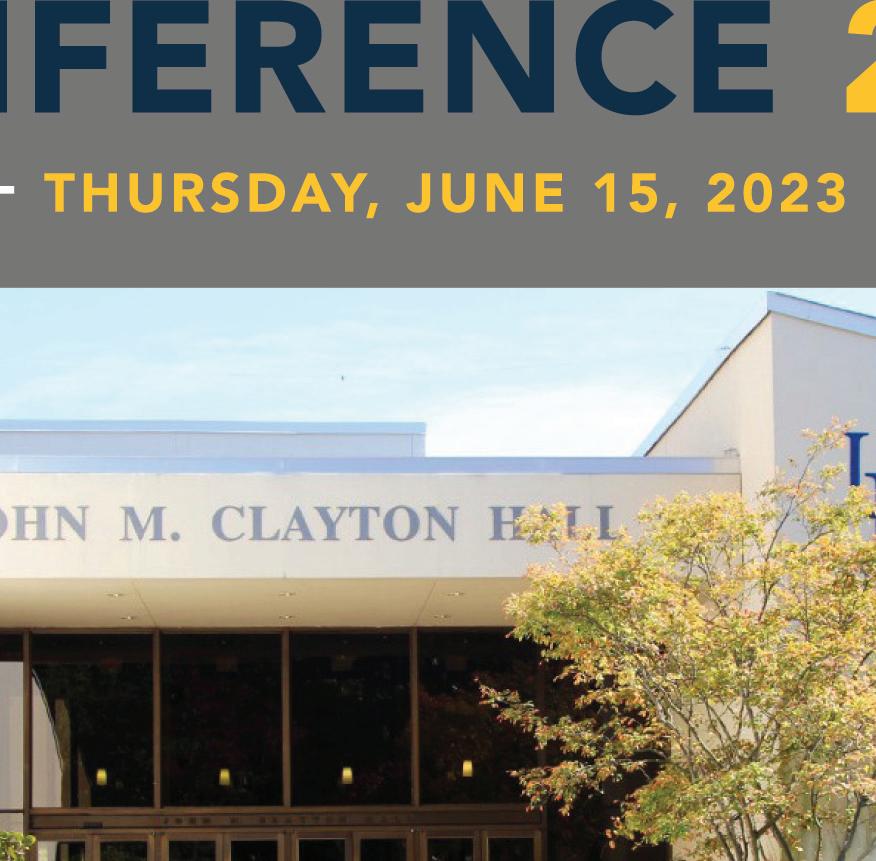
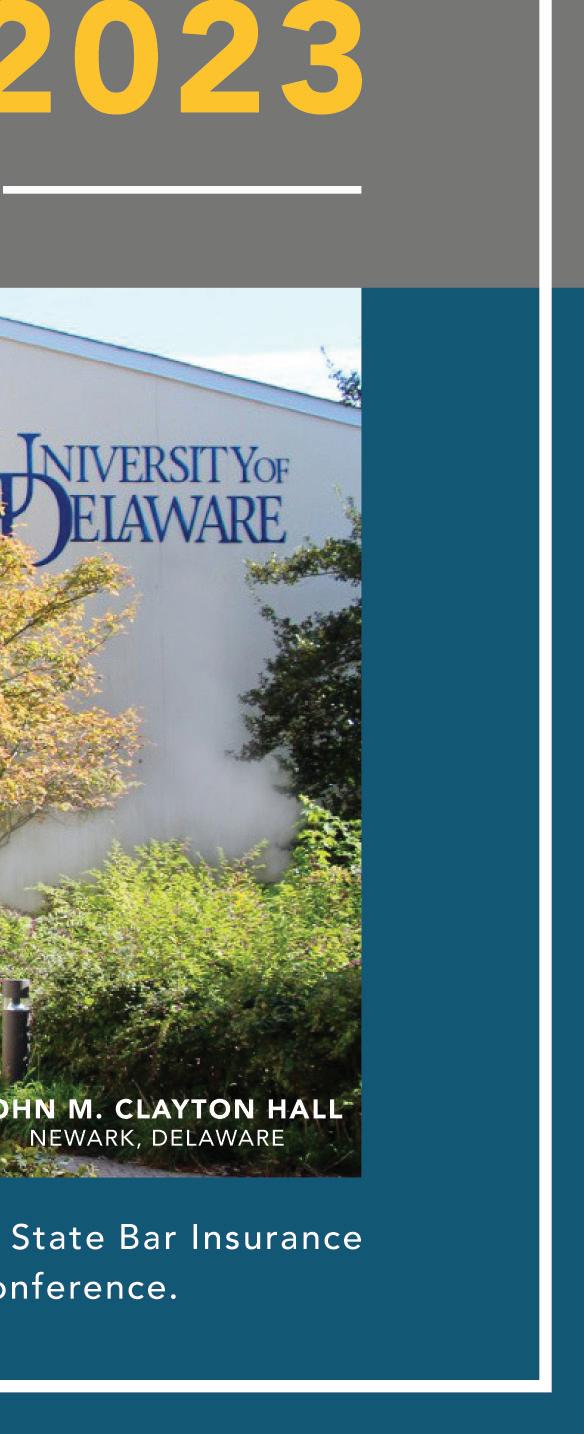

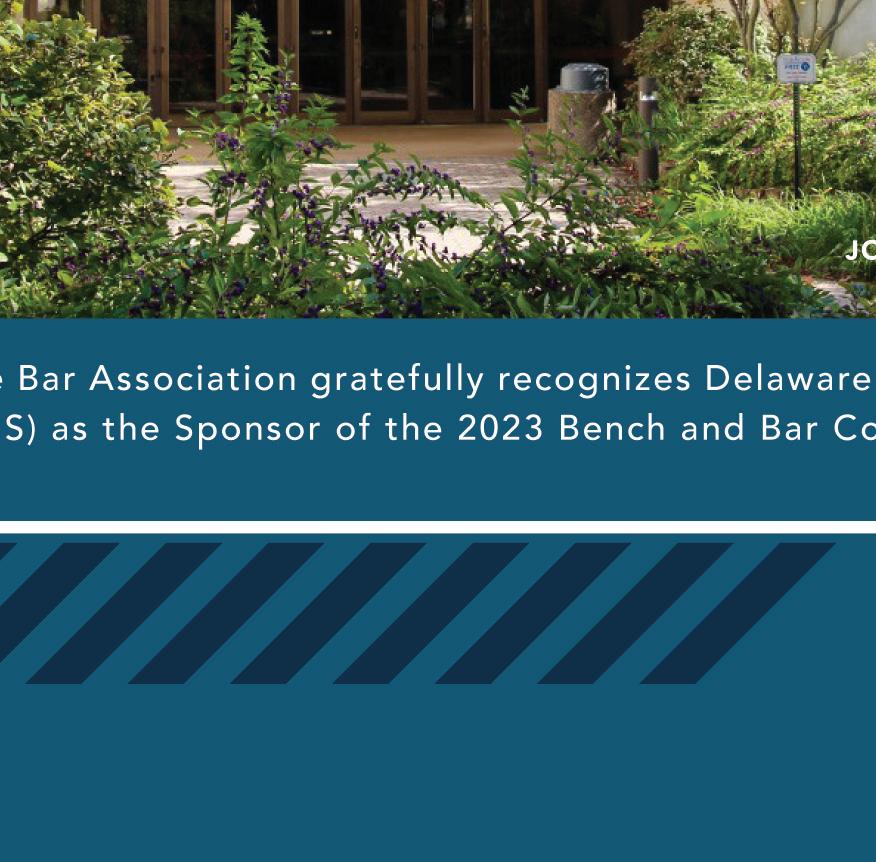




MAY 2023 VOLUME 46 • NUMBER 10
KENT
FEATURING APPRECIATION DELAWARE S TAT E B A R A SSOCIATION HAY RIDES GAMES RAFFLE & PRIZES BONFIRE FOOD TRUCK ICE CREAM FACE PAINTING FAMILIES WELCOME! 20 MAY 1 PM – 4 PM SATURDAY A T RAMSEY’S FARM GO TO WWW.DSBA.ORG TO REGISTER! Complimentary SOCIAL MEDIA PHOTO HEADSHOTS THURSDAY, MAY 18, 2023 AT THE DSBA DOORDASH GIFT CARD • HOME DEPOT GIFT CARD • FREE CLE • AMAZON GIFT CARD GIVEAWAYS EVERY THURSDAY THANK YOU THURSDAYS
COUNTY FOOD TRUCK YOUNG & MCNELIS, DOVER, DE MONDAY, MAY 8, 2023 F E A T URI N G May IS DSBA MEMBER A pp reciation MONTH
PRESIDENT

Charles J. Durante
EXECUTIVE DIRECTOR
Mark S. Vavala
EDITORIAL BOARD



Laina M. Herbert
Jason C. Powell
Kristen S. Swift
Seth L. Thompson
EXECUTIVE COMMITTEE LIAISON
Mary Frances Dugan
EDITORIAL ADVISORY COMMITTEE

Valerie A. Caras
Denise Del Giorno Nordheimer
Adria B. Martinelli
Victoria R. Sweeney
Holly O. Vaughn Wagner
PUBLICATIONS EDITOR
Rebecca Baird

The Bar Journal is published and distributed by the Delaware State Bar Association
405 North King Street, Suite 100 Wilmington, DE 19801

P: 302-658-5279
F: 302-658-5212 www.dsba.org
© Copyright 2023 by the Delaware State Bar Association. All Rights Reserved.
The Bar Journal is the independent journal of the Delaware State Bar Association. It is a forum for the free expression of ideas on the law, the legal profession and the administration of justice. It may publish articles representing unpopular and controversial points of view. Publishing and editorial decisions are based on the quality of writing, the timeliness of the article, and the potential interest to readers, and all articles are subject to limitations of good taste. In every instance, the views expressed are those of the authors, and no endorsement of those views should be inferred, unless specifically identified as the policy of the Delaware State Bar Association.
The Bar Journal is published monthly with a combined July/August issue.
All correspondence regarding circulation, subscriptions, or editorial matters should be mailed to:
Editor, DSBA Bar Journal
Delaware State Bar Association

















405 North King Street, Suite 100 Wilmington, DE 19801 or emailed to: rbaird@dsba.org
Letters to the Editor should pertain to recent articles, columns, or other letters. Unsigned letters are not published. All letters are subject to editing. Send letters to the address above, Attention: Editor, Bar Journal.
FEATURES
The Delaware State Bar Association: 1950 – 1970






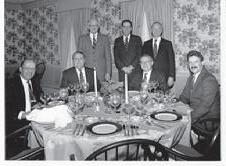

 BY RICHARD D. KIRK, ESQUIRE
BY RICHARD D. KIRK, ESQUIRE
2 DSBA Member Appreciation Month Announcement
39 2023 Bench and Bar Conference Announcement

3 DSBA Bar Journal | May 2023 For Advertising Opportunities Call (302) 658-5279, ext. 102 Email: rbaird@dsba.org Read The Bar Journal online at www.dsba.org COLUMNS 4 President’s Corner 7 Ed itor’s Perspective 12 T ips on Technology 14 Commission on Law & Technology: Lead ing Practices 16 Et hically Speaking 18 Office of Disciplinary Counsel Update 20 The DE-LAP Desk 28 Creating Space in the LAW: Leadership, Advocacy & Women 30 Book Review 34 The Jud icial Palate 38 The Last Word DEPARTMENTS 3 Side Bar 9 Of Note 9 Member News 10 Calendar of Events 11 Sect ion & Committee Meetings 32 In Memoriam: Rodman Ward, Jr. 36 Bul letin Board DSBA BAR JOURNAL MAY 2023 | VOLUME 46 • NUMBER 10
CELEBRATION 1923 2023 CELEBRATION 1923 2023
CELEBRATION 1923 2023
24
PRESIDENT’S CORNER | BY CHARLES J. DURANTE, ESQUIRE
Let the Kids Read
The spine of the book lay prominently on a shelf when I ambled through the library, looking for a break from algebra. Another Country by James Baldwin. I had seen those bulging eyes amidst cigarette smoke in a high-brow discussion on Channel 12, so I gave the book a try.
What a find for a teenager. Words you still can’t use in polite print, steamy sessions, some involving two races, others with only one gender. Suicide, physical abuse, state-sanctioned racism, searing criticism of American society in lancing text, without a wasted word.
New Orleans booksellers were arrested for selling the novel, but it was available to this ninth grader, who fit several hundred pages into study halls — never taking it home — before setting it down to focus on Koufax, Drysdale, and actual assigned reading by Pearl Buck.
Another Country is still available at my high school, but rabid censors on each side of the Mason-Dixon Line are seeking to evacuate Baldwin and hundreds of other novelists, historians, and artists from schools and public libraries in a lumbering assault on heterodoxy of all kinds.
Attacks are emanating from selfidentified citizens counsels, school boards, even governors and Congressional committees. Some arise from the reflexive priggishness of generations of adults, who might routinely drink, gamble, and curse, but think teenagers should be shielded from the world they are entering. Others reflect the centuriesold desire to flinch from honest discus-
sion about America’s complex past. And some anxiety stems from the good-faith apprehension all parents feel as their children pass through a vulnerable age.
May is when Delaware elects its school boards. Eleven school districts hold contested elections this month. Each of these candidates deserves salute, volunteering for interminable meetings with a succession of controversies that would bedevil a full-time judge, and public accountability in the form of phone calls from strangers and interruptions at the grocery store.

This year’s candidates will face pressures to curtail what students can read, see, and discuss in their classrooms. Their response will say much of our state, and how its students will learn.
Much of art and literature is intended to disturb. Parents may not realize it when they read to their preschoolers. The best children’s books are subversive, observed celebrated novelist Alison Lurie, citing Mother Goose, Beatrix Potter, and A.A. Milne. “They mock current
assumptions and express the imaginative , unconventional, non-commercial view of the world in its simplest and purest form.”
Middle-aged adults forget how rapidly those young readers’ minds expand. Someone who fumbles at long division at 8 may be coding at 12. After feeding their pet turtles at 10, they might be doing stem cell research at 15. And when it’s time to read, their curiosity is ravenous. Their bodies are changing. Echoing Corinthians, they want to put away childish things. Every adolescent’s life includes elements of rebellion. For generations, tobacco companies leveraged this impulse into nicotine dependency. Educators realize that their role is to capture this energy, using their resources and wiles to steer teens into zestful learning and early-onset wisdom. Experienced teachers know that force-feeding or censoring adolescents is as effective as pounding the brakes on icy blacktop.
A focused minority is issuing educational gag orders to prevent history classes from reflecting this nation’s experience in its full complexity, to pretend that teenagers don’t deserve to have answers to their questions about sex, to infantilize a generation. A Michigan community voted to defund its public library because it stocked a comingof-age graphic novel exploring gender identity — even after the librarian put it behind her desk, only available by special request — like Deliverance in a previous generation. Teachers in several Florida counties were ordered to make all books inaccessible to students unless they were pre-approved in advance by a central of-
4 DSBA Bar Journal | www.dsba.org
Experienced teachers know that force-feeding or censoring adolescents is as effective as pounding the brakes on icy blacktop.
ficial. A teacher who provided a volume considered “harmful to minors” could be prosecuted for a felony. Comstocks lurk in the community to enforce that in terrorem clause.
Governors are attacking academic expertise. The era when the football coach could keep the legislature’s hands off the anthropology department has ended. A university chancellor who removed Confederate monuments from a Southern campus was herself removed. A Disney movie about school integration was banned. The Kite Runner, The Handmaid’s Tale , and The Fire Next Time have been indexed as Forbidden Texts, along with a host of lesser-known books that touch on police brutality, feminism, family violence, and adolescent self-discovery. Franco banned Jonathan Swift and gelded Hemingway. Castro, like Batista, jailed journalists. In a land that trumpets its freedom, Judy Blume and E.B. White are being embargoed.
Like many other trends, the attacks prey on cultural resentment — “They get the summers off,” one Wisconsin voter told a researcher. “They shower before work, not afterwards” — and are sometimes incited by performative politicians.
The legal profession is founded on the contest of ideas. One cannot practice competently without understanding the other side. A lawyer must know well the contrary argument, and be prepared to parry it in negotiation, overcome it in litigation, or plan around it in structuring transactions.
Ignoring inconvenient information also erodes citizenship. When it becomes widespread, democracy is impaired, compromise is impossible, extremism flourishes.
Hiding tough topics from teens is a losing proposition. Like shouting down
5 DSBA Bar Journal | May 2023 PERMANENT ACCOCIATE | PARTNER | SUPPORT STAFF PLACEMENT SERVICES BUILDING RELATIONSHIPS for OVER 40 YEARS 2022 1980 215.981.5455 kruza.com PERMANENT ACCOCIATE | PARTNER | SUPPORT STAFF PLACEMENT SERVICES BUILDING RELATIONSHIPS for OVER 40 YEARS 2022 215.981.5455 kruza.com PERMANENT ACCOCIATE | PARTNER | SUPPORT STAFF PLACEMENT SERVICES BUILDING RELATIONSHIPS for OVER 40 YEARS 2022 215.981.5455 kruza.com CONTINUED >
The legal profession is founded on the contest of ideas. One cannot practice competently without understanding the other side. A lawyer must know well the contrary argument, and be prepared to parry it in negotiation, overcome it in litigation, or plan around it in structuring transactions.
controversial speakers at a law school, a bowdlerized curriculum cheats students and debases their education, impairing students’ substantive knowledge and analytical ability.
Students will understand what is going on. Some will seek out the proscribed texts. Most will simply become more cynical. Banished books will be just another brick in the wall.
Aristotle, Aquinas, and Maimonides knew better. Alien ideas must be un-
derstood if they are to be answered. Schools can develop a rule of reason on controversial books, as they have since Catcher in the Rye was the target. Youth can develop civic loyalty even if they learn the full facts about the Middle Passage and the Trail of Tears.
The ability to process jarring material is as much a part of education as STEM or gym. Suppressing a child’s natural curiosity is like hanging a millstone around their education.
Chuck Durante, the President of the Delaware State Bar Association, is a partner at Connolly Gallagher LLP, fellow of the American College of Trust and Estate Counsel, chair of the Board of Editors of Delaware Lawyer magazine, president of the Delaware Sports Museum and Hall of Fame, trustee of the Delaware Historical Society and president of the Delaware Sportswriters and Broadcasters Association. He can be reached at cdurante@ connollygallagher.com.

6 DSBA Bar Journal | www.dsba.org CONTINUED > PRESIDENT’S CORNER
Students will understand what is going on. Some will seek out the proscribed texts. Most will simply become more cynical. Banished books will be just another brick in the wall.
For information on submitting articles for publication in the Bar Journal , please contact Rebecca Baird at rbaird@dsba.org. Get Published! The Editorial Board welcomes submissions from attorneys and other professionals who wish to share their expertise on law-related topics in the DSBA Bar Journal .
EDITOR’S PERSPECTIVE | BY SETH L. THOMPSON, ESQUIRE
Stand Alongside of Me
Bar Journal Editor
Seth L. Thompson joined Parkowski, Guerke & Swayze in July 2019, and he works predominantly in the firm’s Wilmington office. His practice focuses on civil litigation, family law, and municipal law. For six years, he also served as a Legislative attorney for the Delaware House of Representatives. He has served on the Board of Professional Responsibility, the Board of Bar Examiners, and the Executive Committee for the Terry-Carey American Inn of Court, as well as serving as the Sussex County Bar Association President. He may be reached at sthompson@ pgslegal.com.

“Once again, there is an unspoken subtext. That is the beauty of music and rock ‘n’ roll….The ‘li li’s — what do they say? They say, ‘Sing with me.’ They also say, ‘Stand alongside of me. We will stand together in this.’” 1
That was Bruce Springsteen’s explanation of the repetitious, mono-syllabic portion of “The Rising’s” chorus in his episode of the VH1 television series VH1 Storytellers on April 23, 2005. And I just thought he ran out of lyrics.2
My younger sister once astutely pointed out that many of my favorite songs have a sing-along element, from stadium rock anthems to 90s hip-hop hooks to sports chants. This may be in part because I am better off trying to carry the piano than the tune. Solo, oh no. Regardless the root, she knows her brother and is fully capable of delivering the occasional eye-opener.
So it stung when, after leaving a late municipal meeting, I called from the car and — belatedly — inquired about any birthday gift preferences, only to receive the simple response of “I just want to see you, Brosk.” 3 Sounded like another emailed gift card was certainly not in order. The request was genuine and not intended as criticism, but it could have rightly been so. Whether it was changed patterns post-pandemic or a sustained peak in work demands, I had not made family visits a priority recently. Now, not only were my outgoing calls log and my newfound benefits of blue light glasses saying it was time to leave the office a little early on Friday for a ride north, so was my sweet sister.
Her birthday evening wound up as just what the family doctor ordered (outside of the take-home bag of Tastykakes and Yocco’s hotdogs and pierogies presumably). Dad enjoyed a respite in a silver lining via receiving a few laughs and more squirms from regaling his three children with the latest installment of “As the Urologist Turns.” Taking a break from resident I.T. specialist and designated typist, Mom basked in her children’s wonderment at Dad attempting to quickly input responses for an internet-based trivia game on his flip phone. And as often seems to be the case with giving time, this donor benefitted as much as, if not more than, the donee.
Last June, my article mentioned the “wellness wheel” from high school health class. An evening with my sisters and parents really gave a boost to the familial portion of the “social” spoke. There were no family band rounds or sing-alongs, but the night’s periodic bursts of laughter carried the semblance of a communal refrain.
As I pack my shoulder bag at the end of a particularly challenging workday, there’s a Bob Dylan line from the song “Hurricane” that sometimes plays in my mind, almost as a salve. “‘It’s my work’ he’d say, ‘and I do it for pay. And when it’s over I’d just as soon go on my way.’” Then the moment passes, and I return to the underlying pride and sense of possibility even in my small part in the legal system’s functioning. Dylan’s call to action, “The Times They Are A-Changin’,” starts with “Come gather round, people,” but the line that resonates most for me is “keep your eyes wide, the chance won’t come again.” I get to give clients a voice, to translate their story into our legal dialect, and to facilitate access to due process, i.e., notice and not just the opportunity to speak but the opportunity to be heard . We as DSBA members stand together in this. Let’s make time for a communal refrain..
Notes:
1. https://www.youtube.com/watch?v=7G_n8l-2SCQ.
2. Alas, Gregory Abbott did not have an episode of VH1 Storytellers, so we are left to wonder if there was a subtext intended for the end of 1986’s Shake You Down or if he was merely riffing with “Eeny-meenyminy-mo” and “Roses are red and violets are blue.”
3. “Brosk” is her term of endearment for me; the immediate family calls her “Boo,” short for “Betsy Boo.”
7 DSBA Bar Journal | May 2023
Tracers
All-in-one public records platform to locate people, investigate businesses, and find assets.







































































Tracers, the #1 cloud-based investigative re search software, is designed to help you find key pieces of information available only in public and private records. Quickly locate witnesses and people, investigate businesses, and find assets by searching addresses, phone numbers, aliases, relatives, and other information. Access dozens of searches from thousands of sources, including criminal records, professional licenses, court records, social media and much more. With Tracers, you get to use scalable search solutions, plans and pricing to match your firm’s needs. And with U.S.-based dedicated account managers on call to help you with any detailed search, Tracers will quickly become a key legal research tool for your firm. DSBA members receive a 10 percent lifetime discount off all Tracers monthly search fees. To learn more or to get started, visit www.dsba.org (member login required).

TIME TO RENEW

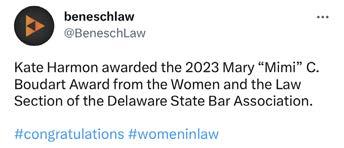


Jo in DSBA
Stay connected through DSBA. Renew your membership for 2023-2024 and enjoy uninterrupted access to all DSBA benefits.
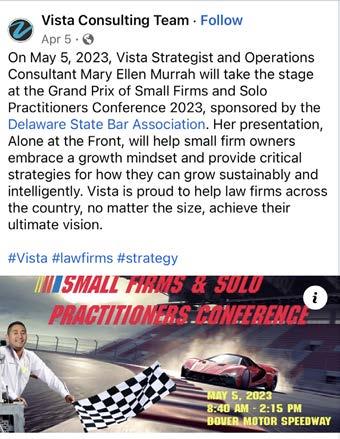
Renewing is easy! Renew today and PAY ONLINE by logging into the Members Area of www.dsba.org.

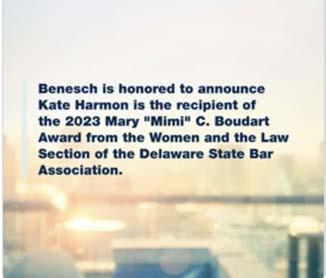
8 DSBA Bar Journal | www.dsba.org SIDE BAR MEMBER BENEFIT OF THE MONTH JOIN THE CONVERSATION Find us on Facebook, Instagram, and Twitter @delstatebar
OF NOTE
Condolences to Christina “Nina” Pappoulis, Esquire, on the death of her husband, Eric W. Fischer, who died on March 5, 2023.
Condolences to Randall E. Robbins, Esquire, on the death of his mother, Elizabeth Eaton Robbins, who died on March 25, 2023.
Condolences to L. Vincent Ramunno, Esquire, and Leo John Ramunno on the death of their brother, Lawrence A. “Larry” Ramunno, Esquire, who died on April 19, 2023.
If you have an item you would like to submit for the Of Note section, please contact Rebecca Baird at rbaird@dsba.org.

MEMBER NEWS
Congratulations to Meghan Butters
Houser, Esquire, of Weiss, Saville & Houser, P.A., and her husband Nate on the birth of their second child, Brayden James Houser, born March 12, 2023.

9 DSBA Bar Journal | May 2023
Fundamentals of Lawyer-Client Relations 2023 May 11, 2023 8:30 a.m. - 4:30 p.m. Visit www.dsba.org to register. Sponsored by the Young Lawyers Section of the Delaware State Bar Association 7.0 Hours of CLE credit in Enhanced Ethics for Delaware and Pennsylvania Attorneys. Complimentary SOCIAL MEDIA PHOTO HEADSHOTS THURSDAY, MAY 18, 2023 10 A.M. - 2 P.M. AT THE DSBA Membership Appreciation Month MAY IS
PROFESSIONAL GUIDANCE COMMITTEE
This committee provides peer counseling and support to lawyers overburdened by personal or practice-related problems. It offers help to lawyers who, during difficult times, may need assistance in meeting law practice demands. The members of this committee, individually or as a team, will help with the time and energy needed to keep a law practice operating smoothly and to protect clients. Call a member if you or someone you know needs assistance.
New Castle County
Karen Ann Jacobs, Esquire, Chair*
Dawn L. Becker, Esquire
Sean Michael Brennecke, Esquire
John P. Deckers, Esquire
David J. Ferry, Jr., Esquire
Antranig N. Garibian, Esquire
Laura Nastase Najemy, Esquire
Denise D. Nordheimer, Esquire
Kuhu Parasrampuria, Esquire
Kenneth M. Roseman, Esquire*
Yvonne Takvorian Saville, Esquire
R. Judson Scaggs, Jr., Esquire*
Victoria R. Sweeney, Esquire
The Hon. Gregory Brian Williams
Lydia E. York, Esquire
Kent and Sussex County
Candace E. Holmes, Esquire, Chair
Crystal L. Carey, Esquire
Clay T. Jester, Esquire
Christopher D. Tease, Esquire
The Hon. William L. Witham, Jr.
Honorary Volunteer Members:
Victor F. Battaglia, Sr., Esquire
Mary C. Boudart, Esquire
Wayne A. Marvel, Esquire
Bayard Marin, Esquire
Michael F. McTaggart, Esquire
Mary E. Sherlock, Esquire**
I. Barry Guerke, Esquire**
Dennis L. Schrader, Esquire**
E. Alan Uebler, Esquire
David A. White, Esquire
Scott Godshall, Executive Director DSBA/DE-LAP Liaison
May 2023
CALENDAR OF EVENTS
Tuesday, May 2, 2023 • 8:30 a.m. – 4:30 p.m.
Workers’ Compensation Seminar 2023
6.5 hours of CLE credit including 1.0 hour of Enhanced Ethics
Live Seminar at Chase Center on the Riverfront
Tuesday, May 2, 2023 • 12:00 p.m.
Law Day Luncheon
Riverfront Events / Hyatt, Wilmington, DE
Friday, May 5, 2023 • 8:40 a.m. – 2:15 p.m.
The Grand Prix of Small Firms and Solo Practitioners Conference
4.5 hours CLE credit including 2.8 hours of Enhanced Ethics
Dover Motor Speedway, Dover, DE
Wednesday, May 10, 2023 • 12:30 p.m. – 3:45 p.m.
Client Capacity, Legal Ethics & Dementia Informed Lawyering
3.0 hours CLE credit including 1.0 hour in Enhanced Ethics Seminar via Zoom
Thursday, May 11, 2023 • 8:30 a.m. – 4:30 p.m.
Fundamentals of Lawyer-Client Relations 2023
7.0 hours CLE credit in Enhanced Ethics
Live Seminar at DSBA
Wednesday, May 17, 2023 • 12:00 p.m. – 1:30 p.m.
Beneficial Ownership Information Reporting under the Corporate Transparency Act
1.5 hours CLE credit
Live Seminar at DSBA with Zoom Option
Thursday, May 25, 2023 • 11:00 a.m. – 12:00 p.m.
Secure 2.0 Act of 2022
1.0 hour CLE credit
Live Seminar at DSBA with Zoom Option
Thursday, May 25, 2023 • 2:00 p.m. – 3:00 p.m.
Deposition Skills in Chancery Court
1.0 hour CLE credit
Live Seminar at DSBA
Dates, times, and locations of Events and CLEs may occasionally change after time of press. Please consult the DSBA website for the most up-to-date information at www.dsba.org.
10 DSBA Bar Journal | www.dsba.org
Practice Monitor
Past Co-Chair BECOME A DSBA SECTION MEMBER Section Membership provides the chance to exchange ideas and get involved. To join a Section, visit www.dsba.org/about-the-dsba/membership. BECOME A DSBA SECTION MEMBER Section Membership provides the chance to exchange ideas and get involved. To join a Section, visit www.dsba.org/about-the-dsba/membership.
*Certified
**
SECTION & COMMITTEE MEETINGS EXECUTIVE COMMIT TEE
May 2023
Tuesday, May 2, 2023 • 3:30 p.m.
Estates and Trusts Section Meeting
Zoom Meeting, see Section listserv message for link and password
Tuesday, May 9, 2023 • 12:00 p.m.
Litigation Section Meeting
Delaware State Bar Association, 405 North King Street, Suite 100, Wilmington, DE
Tuesday, May 16, 2023 • 12:00 p.m.
Corporation Law Section Meeting
Morris, Nichols, Arsht & Tunnell LLP, 1201 North Market Street, Wilmington, DE
Wednesday, May 17, 2023 • 9:00 a.m.
ADR Section Meeting
Zoom Meeting, see Section listserv message for link and password
Wednesday, May 17, 2023 • 12:30 p.m.
LGBTQ+ Section Meeting
Zoom Meeting, see Section listserv message for link and password
Thursday, May 18, 2023 • 12:00 p.m.
Executive Committee Meeting
Delaware State Bar Association, 405 North King Street, Suite 100, Wilmington, DE
Thursday, May 18, 2023 • 4:00 p.m.
Elder Law Section Meeting
Estate and Elder Law Services of Delaware, P.A., 2961 Centerville Road, Suite 350, Wilmington, DE and Zoom Meeting, see Section listserv message for link and password
Thursday, May 25, 2023 • 4:00 p.m.
Family Law Section Meeting
Zoom Meeting, see Section listserv message for link and password
June 2023
Tuesday, June 6, 2023 • 12:00 p.m.
Estates and Trusts Section Meeting
Zoom Meeting, see Section listserv message for link and password
Thursday, June 8, 2023 • 12:00 p.m.
Executive Committee Meeting
Delaware State Bar Association, 405 North King Street, Suite 100, Wilmington, DE
Refer to the DSBA Section Listserv messages for the most up-to-date information on Section Meetings. Please contact LaTonya Tucker at ltucker@dsba.org or (302) 658-5279 to have your Section or Committee meetings listed in the Bar Journal .
Charles J. Durante
President
Kate Harmon
President-Elect
Mary Frances Dugan
Vice President-at-Large
David A. White
Vice President, New Castle County
Anthony V. Panicola
Vice President, Kent County
Alaina M. Chamberlain
Vice President, Sussex County
Samuel D. Pratcher III
Vice President, Solo & Small Firms, New Castle County
Jessie R. Benavides
Vice President, Solo & Small Firms, Kent County
Stephen A. Spence
Vice President, Solo & Small Firms, Sussex County
Francis J. Murphy, Jr.
Secretary
Mae Oberste
Assistant Secretary
Jennifer Ying Treasurer
Ian Connor Bifferato
Assistant Treasurer
Kathleen M. Miller
Past President
The Honorable Abigail M. LeGrow Judicial Member
Brandon R. Harper
Assistant to President
Thomas P. McGonigle
Legislative Liaison
Loren R. Barron
Sean Michael Brennecke
Lori A. Brewington
Crystal L. Carey
Paige C. Chapman
Alberto E. Chávez
Joseph D. Farris III
Richard A. Forsten

Katelin A. Morales
Denise Del Giorno Nordheimer
Victoria R. Sweeney
Members-at-Large
Mark S. Vavala
Executive Director
11 DSBA Bar Journal | May 2023
Coaching Services of Eric M. Doroshow My mentoring and life coaching may help you. I am a Masters Certified Life Coach with over 40 years of legal practice in DE. I am also a published author and watercolorist. Contact me for a free initial coaching session. (302) 998 0100 | Ericd@dplaw.com | DELawyerLifecoach.com 1202 Kirkwood Highway, Wilmington, DE 19805 Need Help Navigating Law and Life Challenges ?
ChatGPT: A Primer
BY EMILY A. BRYANT-ÁLVAREZ, ESQUIRE, AND JEFFREY J. LYONS, ESQUIRE
ChatGPT has enthralled the legal world these past few months, but many lawyers are still in the dark in terms of what it is (and is not), what it is capable of, its current limitations, and whether it is truly coming for our jobs.1 We attempt here to bridge that gap and to provide a brief primer on the technology.
So what is ChatGPT and who created it? Its perhaps ill-suited moniker does it no favors. ChatGPT is just one of several platforms created by OpenAI, an artificial intelligence research and deployment company whose mission is to “ensure that artificial general intelligence benefits all of humanity.”2 As Karen Hao of The Wall Street Journal aptly writes, “[t]he chatbot is part of a wave of so-called generative AI — sophisticated systems that produce content from text to images — that has shaken up Big Tech and is set to transform industries and the future of work.”3

In essence, ChatGPT takes a text prompt from a user in the form of a command or question and generates a response. By way of example, if a user types in a question such as “What fiduciary duties are owed by directors under Delaware law?” ChatGPT is able to rapidly generate a five paragraph answer that identifies and describes such duties. Its latest and most powerful iteration — ChatGPT-4 — has already passed the entire Uniform Bar Examination “by a significant margin,”4 written elaborate briefs and law review articles,5 and even helped a judge write an opinion.6
What, you ask, could go wrong with such technology? Turns out, quite a few things. When a user opens the program, ChatGPT offers the following stock disclaimer:
While we have safeguards in place, the system may occasionally generate incorrect or misleading information and produce offensive or biased content. It is not intended to give advice.7
But such a warning does not necessarily alert users to some of the perils (from relatively benign to serious) of using the AI.
The platform’s limitations and pitfalls have become more obvious as more and more users start to test the waters. Stories of outright fabrications, 8 false accusations,9 and errors10 have begun to spread across the profession. Clients have even begun to question legal research done by partners and associates based on a response from ChatGPT, when in reality ChatGPT had completely fabricated the alleged legal authority.11 In addition, lawyers often rely on confidential information in drafting client memos and briefs. But using that information in a prompt to ChatGPT is expressly discouraged by the creators of ChatGPT,12 and even if the information is not retained by ChatGPT, the AI learns with each conversation and thus there is no telling what it will learn from your client’s confidential information.13
12 DSBA Bar Journal | www.dsba.org TIPS ON TECHNOLOGY
© istockphoto.com/ Aleutie
In the end, it seems inevitable that some type of shakeup is coming and practitioners across the country and the world are paying attention in earnest. Although it seems unlikely that AI will completely replace lawyers for the foreseeable future, there is no doubt that using AI can speed up the writing process, whether performing the first round of research or providing a first draft of an argument for a brief (as long as the cases cited are real!).14 These abilities could seriously impact at least the work of more junior attorneys and potentially lead to a paradigm shift.
Given how new all of this is, but also how important artificial intelligence is and will continue to be to the profession, lawyers should stay informed and complete trainings, lest ChatGPT and other AI platforms render us obsolete and terminate our positions.
**This story was not written with the aid of ChatGPT. We promise. Now where is John Connor?
Emily A. Bryant-Álvarez is Co-Chair of the Young Lawyers Section. Emily (she/ her) is an associate at Quinn Emanuel Urquhart & Sullivan LLP and can be reached at emilybryantalvarez@ quinnemanuel.com.

Jeffrey J. Lyons is CoChair of the Young Lawyers Section. Jeff (he/him) is an associate at Baker & Hostetler LLP. He can be reached at jjlyons@bakerlaw.com.
Notes:
1. See, e.g. , Lohr, Steve. 2023. “A.I. Is Coming for Lawyers, Again”, New York Times, April 10, 2023. https://www.nytimes.com/2023/04/10/ technology/ai-is-coming-for-lawyers-again.html.
2. About. OpenAI. https://openai.com/about.
3. Hao, Karen. 2023. “What Is ChatGPT? What to Know About the AI Chatbot”, Karen Hao, The Wall Street Journal, April 3, 2023. https:// www.wsj.com/articles/chatgpt-ai-chatbot-appexplained-11675865177.
4. Katz, Daniel Martin and Bommarito, Michael James and Gao, Shang and Arredondo, Pablo. 2023. “GPT-4 Passes the Bar Exam”. http:// dx.doi.org/10.2139/ssrn.4389233.
5. See, e.g. , Greene, Jenna. 2022. “Will ChatGPT make lawyers obsolete? (Hint: be afraid)”, Reuters, December 9, 2022. https://www.reuters. com/legal/transactional/will-chatgpt-make-lawyers-obsolete-hint-be-afraid-2022-12-09/.
6. Rose, Janus. 2023. “A Judge Just Used ChatGPT to Make a Court Decision”, Vice News, February 3, 2023. https://www.vice.com/en/ article/k7bdmv/judge-used-chatgpt-to-makecourt-decision.
7. “OpenAI Chat.” Open AI. https://chat.openai. com/.
8. See, e.g. , “A Cautionary Tale About Clever Clients and AI”, ALM/Law.com Litigation Daily, March 28, 2023.
9. See, e.g., Cassens Weiss, Debra. 2023. “ChatGPT falsely accuses law prof of sexual harassment; is libel suit possible?”, ABA Journal, April 6, 2023. https://www.abajournal.com/news/article/chatgptfalsely-accuses-a-law-prof-of-sexual-harassmentis-a-libel-suit-possible?utm_medium=email&utm_ source=salesforce_652871&sc_sid=02962191&utm_ campaign=weekly_email&promo=&utm_content=& additional4=&additional5=&sfmc_j=652871&sfmc_ s=45289136&sfmc_l=1527&sfmc_jb=4003&sfmc_ mid=100027443&sfmc_u=19357497.%27; see also Oremus, Will and Verma, 2023. Washington Post, April 5, 2023. https://www.washingtonpost.com/ technology/2023/04/05/chatgpt-lies/.
10. See, e.g. , “A Cautionary Tale About Clever Clients and AI”, ALM/Law.com Litigation Daily, March 28, 2023.
11. Id.
12. “What Is Chatgpt?” OpenAI Help Center. https://help.openai.com/en/articles/6783457what-is-chatgpt. (“Please don’t share any sensitive information in your conversations [with ChatGPT].”).
13. Grossenbacher, Karla. 2023. “Employers Should Consider These Risks When Employees Use ChatGPT”, Bloomberg Law, February 16, 2023. https://news.bloomberglaw.com/us-lawweek/employers-should-consider-these-riskswhen-employees-use-chatgpt.; Eliot, Lance. 2023. “Generative AI ChatGPT Can Disturbingly Gobble Up Your Private And Confidential Data, Forewarns AI Ethics And AI Law”, Forbes, January, 27, 2023. https://www.forbes. com/sites/lanceeliot/2023/01/27/generativeai-chatgpt-can-disturbingly-gobble-up-yourprivate-and-confidential-data-forewarns-aiethics-and-ai-law/?sh=76366f007fdb.

14. Jefferson, Spiwe L. “Chatgpt and AI Applications for in-House Lawyers.” ACC Docket, March 9, 2023. https://docket.acc.com/ node/3530.
CONFERENCE ROOMS AND SPECIAL EVENT SPACE

THE DSBA HAS MEETING & EVENT SPACE IN THE HEART OF DOWNTOWN WILMINGTON


➤ Perfect for depositions, arbitrations, and committee formation meetings
➤ Across from the Leonard L. Williams Justice Center
➤ Over 2000 sq. ft. of meeting space
➤ Meeting room divisible into three private sections
➤ Free Wi-Fi
➤ Access to a catering kitchen
➤ Competitive rental fees
➤ Handicap accessible
➤ Access to state-of-the-art technology
➤ On-site parking
For more information call (302) 658-5279
13 DSBA Bar Journal | May 2023
In the end, it seems inevitable that some type of shakeup is coming and practitioners across the country and the world are paying attention in earnest.
DELAWARE STATE BAR ASSOCIATION 405 N. KING STREET, SUITE 100 WILMINGTON, DE
The Robots Are Here; An Update
BY MOLLY DIBIANCA, ESQUIRE
It has been approximately five months since ChatGPT was first released to users in the form of GPT-3. It has been about four months since GPT-3 passed the torts and evidence sections of a state bar exam. But the thing about artificial intelligence (“AI”) is that its development has been exponentially faster than previous technologies. And with exponential development comes lots of news. So here are a few updates since my article just two months ago.

ChatGPT’s newest iteration, GPT-4, was released on March 13, 2023, although this version requires a paid subscription, unlike the prior version, which remains free to users. Version 4 took the Law School Admissions Test (“LSAT”) and scored in the 88th percentile, up from the 40th percentile scored by its immediate predecessor, GPT-3.5.
On March 16, 2023, the ABA Journal reported that the new version had taken a 2022 version of the bar exam and had scored in the top 10 percent of test takers.1 To reiterate, within just a few months, ChatGPT was able to go from the bottom 10 percent of test takers to the top 10 percent. If it had been a law-school student, it would have gone from close to failing to law review in a few months.
14 DSBA Bar Journal | www.dsba.org COMMISSION ON LAW & TECHNOLOGY: LEADING PRACTICES
© istockphoto.com/PhonlamaiPhoto
Numbers like that should make lawyers and judges pay attention.
Curious enough to test it for yourself? Paste a statute into the ChatGPT prompt and ask it to explain the law in the form of “If / And / Or / Then / Else / Penalty.” The results can be stunningly accurate.
ChatGPT has been making its rounds not just with hypothetical law students. For example, in late January 2023, the Washington Post reported that Massachusetts state Senator Barry Finegold used the tool to help draft legislation regarding data privacy and security safeguards. 2 In other words, AI is being used not only to interpret statutes but to actually draft statutes.
During the intervening two months since I wrote my first article on AI, Google released to limited pilot users its own large-language model (“LLM”), called Bard. I was one of the lucky ones granted access to Bard and put it to a test of my own. As I did with GPT-3, I asked Bard to define sexual harassment. It declined to do so, however, saying that it is “just” an LLM.
However, when I modified that prompt to ask, “What is sexual harassment and why should it be prevented by employers,” it gave me what I would consider to be a pretty-close-to-perfect answer. Not only did it define unlawful harassment, but it also explained that employers should develop and implement an anti-harassment policy, train employees, and take prompt and effective action to address complaints of harassment. These three steps — prevent, train, and correct — are the three components of an employer’s affirmative defense to a claim of sexual harassment in the workplace. In other words, Bard knocked this one out of the park.
One very notable difference between Bard and ChatGPT-4 is that Bard footnotes its reply, citing in this instance to five online sources (including one book that is available on Books.google.com), with links to each in the footnotes. That’s right — Bard cites its sources in footnotes.
And let me not exclude other notable arrivals in the AI market. If you haven’t yet heard an AI-generated speech, it’s a good time to take a look. These tools enable anyone to create audio by merely typing text into a box. ElevenLabs is one of the big names in the AI-voice space and you can test their offerings for free. If you use a person whose voice is all over the internet — President Biden, for example — the speech that can be generated can be extremely realistic, particularly to those listeners who are not able to pick up on the subtle and nuanced tells that indicate the speech has been crafted together in pieces.

And video is just around the corner. Tools like Pictory allow users to convert articles, scripts, and visuals into video and to then edit, share, and automatically capture and summarize videos. Can you imagine a world where we, as litigators, present video instead of or in support of briefs and memos? Certainly, I would like to imagine a world where I, as reader, could watch a captivating video instead of only reading words on a page. And I suspect I’m not alone.
For those of us who think we can ignore the lightning-speed development of AI, I hope this story prompts you to start reading and paying attention to AI news going forward. I hope it even prompts you to test out tools like ChatGPT. For those who have accepted that the future of legal technology will, inevitably, include AI tools, be careful — the risks are real and not yet mitigated by other technology tools and restraints.
Notes:
1. Weiss, Debra Cassens. “Latest Version of CHATGPT Aces Bar Exam with Score Nearing 90th Percentile.” ABA Journal, March 16, 2023. https://www.abajournal. com/web/article/latest-version-of-chatgpt-aces-thebar-exam-with-score-in-90th-percentile. .

2. Lima, Cristiano. “Analysis | CHATGPT Is Now Writing Legislation. Is This the Future?” The Washington Post. WP Company, January 23, 2023. https://www.washingtonpost.com/politics/2023/01/23/chatgpt-is-nowwriting-legislation-is-this-future/.
Molly DiBianca is the Member In Charge of the Delaware office of Clark Hill, PLC, where she mediates commercial and employment disputes. She can be reached at mdibianca@clarkhill.com.
15 DSBA Bar Journal | May 2023
Anatomy of a Scam
The latest scam targeting Delaware attorneys has received much attention lately. I did a recent “Ethically Speaking” column on this topic. (“Be Scam Aware” November 2022). There have also been continuing education seminars warning of this danger and at least one alert from the Office of Disciplinary Counsel.

It begins like this:
An unsolicited email from Bernard Fortuyn addressed to “undisclosed recipients” with the subject line “I have a local buyer from your state…” The text of the email states:
Hi there. We have a local buyer in your state who is interested in purchasing our high-pressure gas compressor currently located in the USA. More details will be provided if you can take up this matter or a referral will be appreciated.
The email is signed by Bernard C. Fortuyn, Managing Director, Gas Terra B.V., Stationsweg 1, 9726 AC Groningen, The Netherlands.
Another frequent variation purports to be from Bagus Guzman Munir. SRS with the subject line, “Dear Counsel.” This version states:
Dear Counsel, We are a Europe based used machine firm and we need an attorney to assist us in drafting a purchase and sales agreement with a buyer in your
area. Are you able to take this matter? If not, a referral will be appreciated. Thank you. If available and interested kindly contact Daria Dietz directly at deryadietz346@ gmail.com.
The signature line states, “Regards Derya Dietz, Managing Director, Dietz International GmbH and company KG.”
Multiple Delaware attorneys have fallen prey to such solicitations. Whether responding by email or by phone, the scammer readily agrees to whatever terms the attorney suggests. The scammer will immediately send a large cashier’s check as a retainer or payment. Along with the check, the scammer may also provide all the necessary paperwork ready to send to the sham buyer. Frequently, the scam scenario will be a collections matter. Again, all the necessary documents including a draft demand letter to the claimed debtor will be sent to the attorney by the scammer.
Regardless of the mechanics of the scam, three things will happen rapidly. The matter will resolve immediately and
apparently successfully. Your bank will assure you that the cashier’s check for the retainer or from the debtor is good and that your account has been credited in that amount. The scammer will urgently pressure you to disperse some or all of the funds by wire transfer as soon as possible. Only after you make the disbursement will you discover that the that either the scammer’s retainer or the purchaser/ debtor’s cashier’s check or both are fake.
You will immediately attempt to contact the client with no success or false assurances. You will contact your bank to attempt a stop-payment or claw back of the wire transfer. Unfortunately, in most instances you will be advised that the account to which the disbursement was sent has been swept and closed. You will contact local law enforcement and be advised that there is little, if anything, that they can do beyond referring the matter to the FBI. You will learn that the FBI is so overwhelmed with this type of fraud that a prosecution is unlikely, especially if the scam originated overseas. You will contact your malpractice carrier and learn that you do not have coverage for this type of loss. You may self-report your victimization to ODC expecting sympathy and assistance. ODC has, to date, been sympathetic. David White has issued a cease and desist directive to Mr. Fortuyn without a response. It has also been without effect as Mr. Fortuyn continues to solicit victims. However, you will be pressed to immediately replace the missing funds to undo the negative client balances (and possible overdraft) that resulted from paying the scammers with other clients’ escrow funds.
16 DSBA Bar Journal | www.dsba.org ETHICALLY SPEAKING |
BY CHARLES SLANINA, ESQUIRE
Several Delaware law firms have fallen prey to this scam in the past year. A couple of firms got lucky, finding that the funds were safely frozen or intercepted as part of an already ongoing investigation or bank action. Other firms have simply deposited their own funds to cover the losses which to date have been several hundred thousand dollars.
What can you do to protect yourself from these scams? Awareness is the key. But wariness is also essential. If you are primarily a family law or real estate attorney, ask yourself why a foreign company or client selected you to handle a matter outside of your practice area. Some scammers are a bit more sophisticated in their approach. As a result of hacking an email contact list, they may claim that they were referred to you by someone that you actually know giving this solicitation at least a bit of plausibility. Scammers may have simply used the Bar directory to pick a name of the Delaware attorney who referred them to you. Even attorneys who take the extra step of calling the purported client may have their call answered by a “receptionist” identifying the purported company or client. Scammers may create fake websites or hijack the websites of existing companies to bolster their bona fides of being a legitimate client.
In addition to being skeptical and selective in responding to the solicitation, the best defense may be a thorough understanding of the Good Funds Rule. That rule permits disbursements from escrow before a check clears under certain limited circumstances. Scammers will never meet those conditions.
No matter what your bank tells you, make certain that the check has actually cleared before you do any disbursement. Do not accept the bank — especially the tellers’ — assurances that cashier’s checks are the same as cash and that the funds are immediately available. It can take your bank one to two weeks to determine that the check is invalid and usually it’s either a complete forgery or a washed out check with reprinted payee and amount.
To overcome the attorney’s cautionary hesitation in dispersing funds, scammers may exert considerable pressure on the attorney to send funds before the fraud is detected. Scammers will appeal to your sympathies by imploring you to send the funds with claims that they need the funds to stave off bankruptcy, meet payroll, or some other dire need. If that fails, they will attempt to implore you with promises of an increased fee if you expedite their payment. Recently, a client advised me that the scammer atte mpted to invoke the professional
conduct rules with a threat of a disciplinary complaint if the funds were not sent immediately. When that failed, the scammer advised the attorney that they were fired and demanded the return of their file and funds.

Unfortunately, this is the world we live and practice in for the foreseeable future. Make sure that you and all the other attorneys in your firm stay up to date on the latest threats. Attend continuing legal education programs on this topic. Read the bulletins from your malpractice carrier. Check out the fraud alerts posted by the FBI on their website. Finally, be suspicious and remember that if it’s too good to be true, it probably isn’t.
“Ethically Speaking” is intended to stimulate awareness of ethical issues. It is not intended as legal advice nor does it necessarily represent the opinion of the Delaware State Bar Association.
“Ethically Speaking” is available online. Columns from the past five years are available on www. dsba.org.
Charles Slanina is a partner in the firm of Finger & Slanina, LLC. His practice areas include disciplinary defense and consultations on professional responsibility issues. Additional information about the author is available at www. delawgroup.com.
17 DSBA Bar Journal | May 2023
©
istockphoto.com/1424201452
The Role of Disciplinary Counsel
BY RICHARD P. S. HANNUM, ESQUIRE
The Delaware Office of the Disciplinary Counsel ( “ODC”) serves at the pleasure of the Delaware Supreme Court. As is implicit in its name, one of its responsibilities is addressing issues of necessary discipline resulting from complaints made against lawyers practicing in Delaware or directed to those alleged to be engaging in Unauthorized Practice of Law (“UPL”). This does not include the adjudication of fee disputes between lawyers and their clients. Fee disputes should be directed to the Delaware State Bar Association’s Fee Dispute Committee.
Assuming the lawyer is subject to the disciplinary jurisdiction of the Delaware Supreme Court, ODC evaluates complaints to determine whether the conduct alleged is sufficient to raise a reasonable inference of misconduct or incapacity under the Delaware Lawyers’ Rules of Professional Conduct. UPL matters are reviewed under the Rules of the Unauthorized Practice of Law Subcommittee of Board on Professional Responsibility. Both sets of Rules can be found in Volume 2 of the Delaware Rules Annotated or on ODC’s website: courts.delaware.gov/odc. As a matter of interest, more than 95 percent of complaints are dismissed.
After reviewing the evidence, ODC may dismiss the complaint, with or without a warning or conditions, proceed with further investigation, or seek to initiate formal proceedings. Participants will be notified in writing regarding disposition of the complaint. Forms and instructions for filing a complaint are available on the ODC website.
The ODC maintains an ethics hotline. This is available for questions by lawyers who are concerned whether potential action might violate ethical restrictions or be an UPL. Approximately 100 calls or emails are handled by the hotline on an annual basis. The hotline can be reached by sending an email to ARMS_ODC_EHOTLINE@ delaware.gov or by phone at (302) 651-3931.
Richard P. S. (“Buzz”) is a graduate of the University of Pennsylvania (1966) and Dickinson Law School (1974). He was admitted to the Delaware Bar in 1974 and the Pennsylvania Bar in 1979. Buzz retired in 2007 and currently volunteers at the Office of Disciplinary Counsel (ODC), Delaware Volunteer Legal Services (DVLS), and Delaware Limited Legal Aid. He can be reached at bhannum2001@ yahoo.com.

ODC is also an active participant in the CLE effort, having given 29 seminars in 2022 addressing areas of interest. CLE credits are available for those that attend. Notice of the scheduling of these seminars is disseminated by the Bar Association as well as various Inns of Court.
In addition, ODC is available to aid lawyers who find themselves facing problems in their practice involving substance abuse, psychiatric issues, or other practice related overwhelming issues. A call for help to the ODC office (302) 651-3931 is likely to result in a referral to the Delaware Lawyers Assistance Program (“DE-LAP”).
This short summary is designed to acquaint the community with the role of the ODC to assist in the maintenance of the high reputation that the Delaware Bar has both nationally and internationally. Any questions should be resolved by a phone call to the ODC office or by reference to the website.
OFFICE OF THE DISCIPLINARY COUNSEL
ETHICS HOTLINE BY PHONE
(302) 651-3931
Advise the receptionist you are making an Ethics Hotline call.
ETHICS HOTLINE BY EMAIL
ARMS_ODC_EHOTLINE@delaware.gov
18 DSBA Bar Journal | www.dsba.org
OFFICE OF DISCIPLINARY COUNSEL UPDATE
?



19 DSBA Bar Journal | May 2023 JUSTLEG ALINC. . . .continuing our commitment to excellence SEEKINGCANDIDATESFORTHE FOLLOWING… • Civil Litigation (Gen/Corp/Comm) 2-8 years • Bankruptcy 2-7 years • Assistant General Counsel, SEC Disclosure • Patent Litigation 2-5 years • Chancery/Corp Governance 2-5 years • White Collar Criminal Defense • Family Law If you are thinking of a move and have portables, we have some additional amazing opportunities (5 yrs. in practice area min). * All Positions can be found on our website at: www.justlegalinc.com JUST IN CASE • JUST IN TIME • JUST FOR YOU Pr oud to be cele brating 20 year s in business! Contact our Director of Attorney Placement, Dana Spring Monzo, at DMonzo@JustLegalInc.com Confidentiality always maintained! David B. Stratton We Welcome To Whiteford As Senior Counsel www.whitefordlaw.com DE▪DC▪KY▪MD▪NY▪PA▪VA “We are extremely pleased to welcome David to the firm. He brings to Whiteford more than 45 years of experience as a leading bankruptcy advisor.” ~ Managing Partner Martin Fletcher Mr. Stratton is consistently recognized by Chambers USA as a Band 1 leading practitioner in Bankruptcy/Restructuring. He is a Fellow with the American College of Bankruptcy. Looking for legal help? A legal aid agency may be able to help! BANKRUPTCY HOUSING DOMESTIC VIOLENCE ISSUES WITH AGING FAMILY LAW ISSUES PUBLIC BENEFITS DISABILITY LAW IMMIGRATION DELegalHelpLink.org Take advantage of the target audience of the DSBA Bar Journal and initiate new business through referrals and building your brand. For more information, contact Rebecca Baird at (302) 658-5279 or rbaird@dsba.org. Placing an ad is easy! ARE YOU ATTRACTING NEW BUSINESS?
The Archbishop’s Suggestion
Disturbing reports of lawyer survey data continue to find their way into our email boxes. Our friends in the New Jersey State Bar Association provide the most recent figures. Last November, NJSBA conducted a wellness survey of New Jersey attorneys, consisting of 90 questions and 1,643 New Jersey lawyers responded. NJSBA released its survey report on April 13. NJSBA President Jeralyn L. Lawrence, and the engine behind the survey decision, summarized its results with one sentence: “It’s clear that we are a profession in crisis.”1
A crisis indeed:
▪ 68 percent reported feeling anxious in the past two weeks;
▪ 56 percent reported a high prevalence of alcohol misuse;
▪ 49 percent of lawyers reported moderate to high levels of burnout;
▪ 49 percent reported feelings of isolation;
▪ 23 percent reported a high prevalence of depressive symptoms;
▪ 28 percent of attorneys considered leaving the profession as a result of mental health, burnout, or stress; and
▪ 10 percent reported thoughts of suicidal ideation. 2
This portrait of a collapsing bar might distress the courts and certainly alarm a Bar Association President. It certainly aroused President Jeralyn Lawrence, and it should certainly arouse us: “When you hear 28 percent are thinking about leaving the profession, red flags are going up around us.”3
New Jersey’s study of this frightened portrait does not stand alone. The largest unified bar in the United Sates, the District of Columbia Bar,4 joined with the California Lawyers Association in 2020 to fund a survey which examined the following:
Using a random sample of approximately 2000 practicing lawyers from California and Washington D.C., the latest research examined the relationship between thoughts of suicide and various factors that negatively and disproportionately affect lawyers including perceived stress, loneliness, work overcommitment, work-family conflict, alcohol use, and prior mental health diagnosis.5
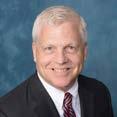
The CLA/D.C. Bar team released their report in February 2023. Their “key findings”:
▪ Lawyers were twice as likely as the general population to experience suicidal ideation.
▪ Perceived stress was the number one predictor of suicidality; compared to lawyers with low stress, those with high stress were a remarkable 22 times more likely to experience suicidal thoughts, and lawyers with intermediate levels of stress were 5.5 times more likely.
▪ Lonely lawyers were nearly three times more likely to have suicidal thoughts, and those who are highly over-committed to work more than twice as likely.
20 DSBA Bar Journal | www.dsba.org
THE DE-LAP DESK | SCOTT GODSHALL, EXECUTIVE DIRECTOR
© istockphoto.com/ treety
“It’s clear that we are a profession in crisis.”
▪ Male lawyers were twice as likely to contemplate suicide, a notable difference from the general population where women experience higher levels of suicidal ideation. Prior mental health diagnosis also increased risk of suicidal ideation.
▪ A significantly greater proportion of lawyers who contemplated suicide indicated that working in the legal profession was detrimental to their mental health and contributed to their substance use and feelings of burnout.
▪ The profile of a lawyer with the highest risk for suicide was a lonely or socially isolated male with a high level of unmanageable stress, who was overly committed to their work, and may have a history of mental health problems. The heightened risk of suicidal ideation extends well beyond this specific profile.6
In addressing the mental health problems faced by lawyers, the reports focus intensely, appropriately, and on the problems that appear once law school ends and law practice begins: unmanageable stress, anxiety, 24-hour work schedules,7 “high levels” of burnout, isolation, high prevalence of depressive symptoms, alcohol misuse, and suicide ideation. Each of these issues can be, and was, addressed in Wellness studies. 8 Are there trails we can track, trails that focus on issues that troubled lawyers brought with them when they took their first law school class? Jeralyn L. Lawrence thought so.
Getting Upstream
We need to stop just pulling people out of the river.
We need to go upstream and find out why they are falling in.
THE CONSEQUENCES OF TRAUMA
According to the Center for Substance Abuse Treatment’s publication TraumaInformed Care in Behavioral Health Services , the following are potential consequences of childhood trauma that may be experienced during adulthood:13
Delayed Emotional Reactions
Irritability and/or hostility; Depression; Mood swings, Instability; Anxiety (e.g., phobia, generalized anxiety); Fear of trauma recurrence; Grief reactions; Shame; Feelings of fragility and/or vulnerability; Emotional detachment from anything that requires emotional reactions (e.g., significant and/or family relationships, conversations about self, discussion of traumatic events or reactions to them).
Delayed Physical Reactions
Sleep disturbances, nightmares; Somatization (e.g., increased focus on and worry about body aches and pains); Appetite and digestive changes; Lowered resistance to colds and infection; Persistent fatigue; Elevated cortisol levels; Hyperarousal; Long-term health effects including heart, liver, autoimmune, and chronic obstructive pulmonary disease.14
Delayed Cognitive Reactions
Intrusive memories or flashbacks; Reactivation of previous traumatic events; Self-blame; Preoccupation with event; Difficulty making decisions; Magical thinking: belief that certain behaviors, including avoidant behavior, will protect against future trauma; Belief that feelings or memories are dangerous; Generalization of triggers (e.g., a person who experiences a home invasion during the daytime may avoid being alone during the day); Suicidal thinking.
Delayed Behavioral Reactions
Avoidance of event reminders; Social relationship disturbances; Decreased activity level; Engagement in high-risk behaviors; Increased use of alcohol and drugs; Withdrawal.
Delayed Existential Reactions
Questioning (e.g ., “Why me?”); Increased cynicism, disillusionment; Increased self-confidence (e.g., “If I can survive this, I can survive anything”); Loss of purpose; Renewed faith; Hopelessness; Reestablishing priorities; Redefining meaning and importance of life; Reworking life’s assumptions to accommodate the trauma (e.g., taking a self-defense class to reestablish a sense of safety).
NJSBA President Jeralyn L. Lawrence put Archbishop Desmond Tutu’s assertion in bold on the first page of her Introduction to the Survey Results.9 It opens the door to a variety of mental health issues that we can address in the hope of helping our colleagues. Where do we start?
One place to start: childhood trauma leading to adult symptoms trauma.
A definition:
While trauma has many definitions, typically in psychology it refers to an experience of serious adversity or terror — or
the emotional or psychological response to that experience. Trauma-informed care or services are characterized by an understanding that problematic behaviors may need to be treated as a result of the ACES (Adverse Childhood Experiences) or other traumatic experiences someone has had, as opposed to addressing them as simply willful and/or punishable actions.10
21 DSBA Bar Journal | May 2023 SIDE BAR
CONTINUED >
The breadth of trauma experience:
According to the Substance Abuse and Mental Health Services Administration, 61 percent of men and 51 percent of women report at last one traumatic event in their lifetimes. This would put mental trauma at the top of the list of most-common psychological health conditions.11
Many individuals experience trauma during their lifetimes. Although many people exposed to trauma demonstrate few or no lingering symptoms, those individuals who have experienced repeated, chronic, or multiple traumas are more likely to exhibit pronounced symptoms and consequences, include substance abuse, mental illness, and health problems. Subsequently, trauma can significantly affect how an individual engages in major life areas as well as treatment.12
The point here is not to terrify and is not to mark lawyers as exceedingly ill. The percentage of individuals struggling as a result of trauma in their early years is small. The point here is to alert lawyers facing difficulties to dig into earlier problems and to seek help where necessary. Are the reactions listed above familiar to you? Several are familiar to me; I am still working on them. Are they interfering with your with your wellbeing? With your law practice? If so, have your reached out to a therapist? Attending law school and practicing law are mighty difficult as it is. The time has come to address your issues and to address them fully.
If you need help or would like more information, call DE-LAP at (302) 7770124 or email sgodshall@de-lap.org. All correspondence is confidential.

Notes:
1. Survey On NJ Attys’ Mental Health Finds “Profession in Crisis,” Law360, 4/13/2023. See NJSBA Report Recommends Path to Ease Areas of Stress in the Legal Profession, News and Events, http:/tcms.njsba.com. Hats off to Richard Forsten for finding the NJ report and passing it along.




2. Law 360, 4/13/2023 issue.
3. Id.
4. The D.C Bar has more than 111,000 members in all 50 states and more than 80 countries and territories. See www.dcbar.org.
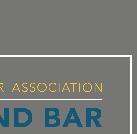
5. Foley, Brian. “Lawyers with High Stress 22 Times More Likely to Contemplate Suicide than Those with Low Stress.” California Lawyers Association, February 13, 2023. https://calawyers.org/ california-lawyers-associatin/lawyers-high-stresscontemplate-suicide/.
6. Id
7. Smith, Patrick.“‘You Are Online 24/7’: Why a Paul Hastings Presentation Went Viral and What It Says about Law Firm Culture.” The American Lawyer, April 5, 2023. https://www.law.com/ americanlawyer/2023/04/05/you-are-online247-why-a-paul-hastings-presentation-wentviral-and-what-it-says-about-law-firm-culture/?sl return=20230318135055.
8. One example: Anna Levine, Esquire, NJLAP’s Director, programmed five-day webinars during NJLAP’s Week In Law (May 1-5):


Monday: Physical Well-Being
Tuesday: Spiritual Well-Being
Wednesday: Career & Intellectual Well-Being

Thursday: Social Well-Being
Friday: Emotional Well-Being.
9. “Putting Lawyers First Task Force: An Excerpt of the Report and Recommendations on Improving the Legal Profession for Lawyers.” Pg. 3. New Jersey Bar Association, March 2023. https:// tcms.njsba.com/PersonifyEbusiness/default. aspx.


10. “What Are ACEs? and How Do They Relate to Toxic Stress?” Center on the Developing Child at Harvard University, October 30, 2020. https:// developingchild.harvard.edu/resources/acesand-toxic-stress-frequently-asked-questions/.
11. “Statistics for Mental Trauma: How Common Is IT & Who It Affects.” FHE Health – Addiction & Mental Health Care. Accessed April 18, 2023. https://fherehab.com/trauma/statistics.
12. Trauma-Informed Care in Behavioral Health Services, Treatment Improvement Protocol (TIP) Series , No. 57, Center for Substance Abuse Treatment, Substance Abuse and Mental Health Services Administration, Report No.: (SMA) 144816, 2014 (Italic added).




13. Id. , Exhibit 1.3-1, Immediate and Delayed Reactions to Trauma.
14. See “Child Abuse & Neglect,” Volume 76, February 2018, pp. 138-148.
22 DSBA Bar Journal | www.dsba.org CONTINUED > THE DE-LAP DESK
Scott Godshall is the Executive Director of the Delaware Lawyers Assistance Program and can be reached at sgodshall@de-lap.org.
NEVER MISS AN ISSUE! View back issues of the DSBA Bar Journal at www.dsba.org. MAY2023 OLUME NUMBER
The point here is to alert lawyers facing difficulties to dig into earlier problems and to seek help where necessary.


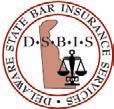


23 DSBA Bar Journal | May 2023 USI Affinity & The Delaware State Bar Insurance Services –Where Lawyers Go For Protection. Call today for more information on the insurance products available to The Delaware State Bar members. 302.658.8000 | www.dsbis.com www.dsbis.com DSBIS brings decades of risk management experience, a proprietary risk analysis process and a local team supported by the expertise of USI Affinity. Since 1940, our Wilmington office has provided the insurance solutions and services that lawyers count on to protect their firms, their employees and their families.
DELAWARE STATE BAR INSURANCE SERVICES USI Affinity & The Delaware State Bar Insurance Services –Where Lawyers Go For Protection. Call today for more information on the insurance products available to The Delaware State Bar members. 302.658.8000 | www.dsbis.com www.dsbis.com DSBIS brings decades of risk management experience, a proprietary risk analysis process and a local team supported by the expertise of USI Affinity. Since 1940, our Wilmington office has provided the insurance solutions and services that lawyers count on to protect their firms, their employees and their families.
Powered
by
1675 S. State St., Suite 4A, Dover DE 19901 302-724-5062 F: 302-724-5063 jkatesmd@outlook.com /DocJLK IME, DME & Record Evaluation Over 10 Years Experience 48 Hour Turnover In Most Cases Board Certified In Orthopaedic Surgery Licensed in DE, PA & FL 1675 S. State St., Suite 4A, Dover DE 19901 302-724-5062 F: 302-724-5063 jkatesmd@outlook.com /DocJLK IME, DME & Record Evaluation Over 10 Years Experience 48 Hour Turnover In Most Cases Board Certified In Orthopaedic Surgery Licensed in DE, PA & FL 487 S. Queen St., Dover, De 19904 Join us on A #TBTatBandB2023 THURSDAY, JUNE 15 SAVE THE DATE CELEBRATING 100 YEARS CLAYTON HALL NEWARK, DELAWARE BENCH AND BAR CONFERENCE 2023 CELEBRATION 1923 2023 Throwback Thursday
Powered
by
THE DELAWARE STATE BAR ASSOCIATION 1950 – 1970
BY RICHARD D. KIRK, ESQUIRE
The nineteen fifties and sixties were times of growth and change in the country — the start of the baby boom, the suburbanization of America, the aftermath of Brown v. Board of Education , the start of the Interstate Highway System, the Cold War, the Space Race, the war in Vietnam and its effect here at home, the Civil Rights campaign, political assassinations, and more. Not much of this turbulent history jumps off the pages of the DSBA’s minute books. (The Association is missing large parts of the minute record from the 1960s, and it is possible that more would be reflected in the missing minutes.) Instead, the minutes show a hard-working core of voluntary leaders — officers and committee chairs — trying hard to represent the interests of DSBA’s lawyer members, the courts, and the public interest. It is mostly mundane reading, but it is at the same time heartening to read the storied names (name partners in all the major Delaware firms and noted judges on all the Delaware courts) who faithfully and vigorously carried the Bar’s work forward.
In the early 1950s, meetings of the DSBA were general membership meetings, not, as at present, meetings of the executive committee. They were called on notice, usually designated “special meetings,” and originally held at the Hotel du Pont. In September 1953, President William Foulk suggested that the DSBA adopt a regular monthly meeting schedule. Since the Hotel du Pont could not accommodate a set monthly schedule, he suggested monthly luncheon meetings at the Hotel Rodney (located where the office tower designed by I.M. Pei now stands). Monthly meetings then continued at the Hotel Rodney into early 1958, when they returned for a time to the Hotel du Pont.
The DSBA began to hold monthly luncheon meetings at the Eagle Restaurant on Ninth Street in October 1959. (There seems to be no record
of a September 1959 meeting to show why the move was made.) Monthly luncheons were held at the Eagle in October, November, and December 1959. At the December meeting, future DSBA president Irving Morris moved that the DSBA change the location of its meetings from the Eagle because of its discriminatory practices. (The Eagle Restaurant and its landlord, the Wilmington Parking Authority, had been sued by William “Dutch” Burton alleging that he was denied service at the restaurant solely because of his race. The United States Supreme Court upheld a judgment for Mr. Burton in 1961.) Mr. Morris’s motion was tabled, and the matter was referred to the executive committee. No executive committee minutes exist, but the next meeting and future meetings were at the Hotel du Pont.
At those meetings, individual nominations to membership in DSBA were made and approved. These motions reflect a Who’s Who of the Delaware Bar in the latter half of the twentieth century. Committee reports were received. At meetings in January and February, the committees on General Legislation and Corporate Legislation typically made reports on legislation of interest to the legal profession that was to be proffered to the General Assembly by the DSBA or opposed in the General Assembly by the DSBA. In early 1951 the main topic was the final leg of the constitutional amendment creating a separate Supreme Court, something the DSBA had favored for years.
The DSBA held annual dinner meetings in the winter, and frequently held dinner meetings in Rehoboth in the summer months. These social events continued well into the 1980s. The DSBA began celebrating Law Day U.S.A. from its very first appearance in 1958, something that continues to the present.
24 DSBA Bar Journal | www.dsba.org FEATURE
One other meeting of note was mentioned in minutes of a regular meeting held on April 21, 1966, namely the upcoming Fourth Judicial Conference, which was the forerunner of the annual Bench and Bar Conference. The DSBA records do not seem to have a record of the meeting itself, or any of the apparent first three Judicial Conferences.
All that said, I want to drill down on a series of meetings in 1958 to look at what transpired at the meetings and who made things happen. The very first Law Day U.S.A. celebration in Delaware was held on May 1, 1958, when the American Bar Association first announced it. At that meeting, DSBA President H. Albert Young announced that the Association’s annual dinner the following month would honor lawyers who had practiced for 50 years or more. That dinner meeting was held on May 23, 1958, at the Wilmington Country Club (almost certainly the old Wilmington Country Club on Pennsylvania Avenue opposite Tower Hill School). President Young had served as Delaware’s Attorney General from 1951-1955, when the modern Delaware Department of Justice was forming. As his term as DSBA president ended in 1959, he founded the firm that is now Young Conaway Stargatt & Taylor, LLP. He introduced Chief Justice Clarence A. Southerland for welcoming remarks.
The Chief Justice was a towering figure in the Delaware Bar, and one of the
leading figures in the fifties and sixties. After earning his law degree from Georgetown in 1913 taking courses at night, he returned to Wilmington and began practice. In addition to private practice, Southerland was a deputy attorney general, then chief deputy attorney general, and then was elected Delaware’s attorney general and served a four-year term (1925-29). As his term was ending, he joined the Wilmington firm of Ward & Gray, Delaware’s oldest law firm (now known as Potter Anderson & Corroon LLP), soon becoming its preeminent lawyer. He served as DSBA president from 1933-35. When the Delaware Constitution was finally amended in 1951 to provide for a separate Supreme Court, Governor Elbert N. Carvel nominated Southerland to become the first Chief Justice, a position he held for a full twelve-year term. Like subsequent Chief Justice Veasey, Chief Justice Southerland became Chief Justice having reached the pinnacle of private practice but with no prior judicial experience. After leaving the Court, Chief Justice Southerland was appointed chair of the Delaware Corporation Law Revision Commission tasked with studying and revising the Delaware General Corporation Law. Other prominent members of the commission were vice chair Richard Corroon (Potter Anderson & Corroon LLP), S. Samuel Arsht (Morris, Nichols, Arsht & Tunnell LLP), and Henry Canby (Richards, Layton & Finger, P.A.). The commission hired Professor Ernest L. Folk III as its reporter. The commission’s work led to the enactment of the landmark 1967 General Corporation Law revision.
President Young then introduced Judge John Biggs, Jr., Chief Judge of the Third Circuit, as toastmaster. Judge Biggs, too, was a dominant figure. Judge Biggs’ father had been Delaware Attorney General (1887-92) and also chaired the Constitutional Convention that led to the adoption of the 1897 Constitution. Judge Biggs graduated from Princeton (1918) and Harvard Law School (1922). While at Princeton he roomed with and edited a literary magazine with F. Scott Fitzgerald. Judge Biggs became Fitzgerald’s executor on his death in 1940. He practiced in Wilmington and became a leader in Democratic politics both locally and nationally, in fact giving President Roosevelt’s re-nomination speech at the Democratic National Convention in 1932. He was appointed to the Third Circuit in 1937 by President Roosevelt.
The honorees at the dinner in June 1958, were an all-star cast: John Cass, Edward Cooch, William Watson Harrington (former Chancellor), Daniel O. Hastings (former U.S. Senator), Edmund Hellings (former Wilmington Municipal Court Judge), John Hutton, John Huxley, Daniel J. Layton (former Delaware Supreme Court Justice), Hugh M. Morris (former federal judge), Charles S. Richards (former Delaware Chief Justice), Reuben Satterthwaite, Jr. (former Delaware Attorney General), Frank L. Speakman (former Delaware Superior Court Judge) and Richard S. Rodney (former federal judge). The event was attended by 275 members and guests, representing a significant part of the DSBA membership.
25 DSBA Bar Journal | May 2023 CELEBRATION 1923 2023
CONTINUED >
The minutes show a hard-working core of voluntary leaders — officers and committee chairs — trying hard to represent the interests of DSBA’s lawyer members, the courts, and the public interest.
At the DSBA annual meeting the next month, President Young said that the reaction and response to the recent banquet celebrating the 50-year members was so strong that he was appointing Chief Justice Southerland to head a committee to compile and publish anecdotes from members of the bar to preserve them for posterity.
At a July 16, 1958 executive committee meeting at the Hotel du Pont’s Green Room, Mr. Young confirmed that Chief Justice Southerland had been named chair of the special “historical sketches” committee, which would consist further of John Biggs, III (Judge Biggs’ son), Joseph Flanzer, Senator Daniel O. Hast-
ings, Clair J. Killoran, The Honorable G. Burton Pearson, William S. Potter, Isaac D. Short, II, and N. Maxon Terry. Robert H. Richards, Jr. joined the committee shortly thereafter. The publication resulting from the committee’s work was to be copyrighted in the name of Delaware State Bar Association.
At the next meeting of the DSBA, on September 25, 1958, President Young asked for and received ratification of the actions of the executive committee in appointing the special publication committee members and approving necessary expenditures to carry out the committee’s task. In the absence of the Chief Justice, William Potter reported that the committee had engaged a Mr. Dudley Lunt to do some work on the project. Mr. Lunt was a Delaware lawyer and an accomplished historian. He had been engaged by then lawyer Clarence Southerland in the 1930s as part of the historic litigation brought by the State of New Jersey against the State of Delaware to determine the boundaries between those states. Mr. Lunt traveled to England to do original research into royal land grants and property transfers.
The book took longer than expected, but only because it had become much more than a collection of anecdotes. It is a valuable historical portrait of the Delaware judicial system from colonial times forward. When finished, Tales of the Delaware Bench and Bar was introduced by Chief Justice Southerland at a DSBA meeting on May 3, 1962. The members approved a resolution authorizing the DSBA to borrow $7,000 from the Delaware Trust Company to create an account to cover the expenses of actually publishing the book and to receive payments from sales of the book.
Tales of the Delaware Bench and Bar formally appeared in 1963, published by the University of Delaware Press, crediting Mr. Lunt’s authorship, and with the Delaware State Bar Association copyright. It was thus the first of DSBA’s historical publications. Copies of the book are in many of the state’s public libraries and used copies are available for purchase through sites like Amazon.
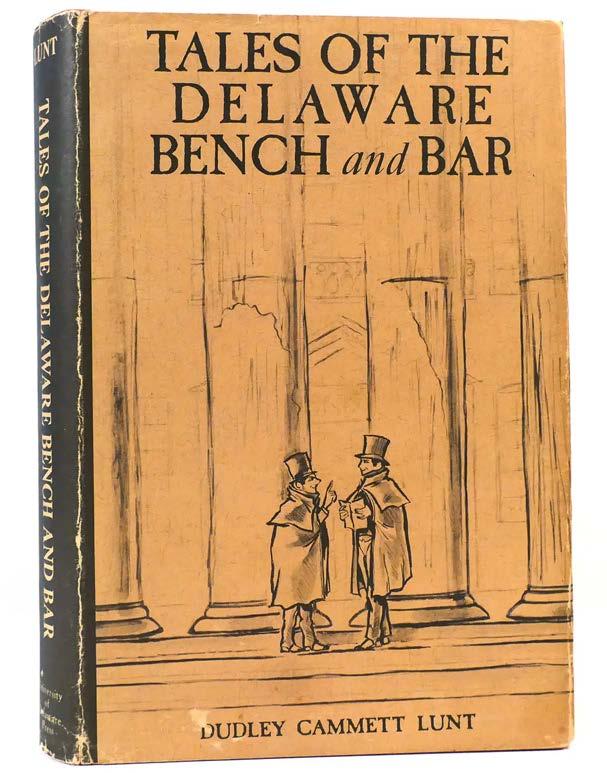
Dick Kirk clerked for Justice William Duffy in 1978-79, when the Supreme Court expanded from three to five members. He then practiced in Delaware for the next 40 years before retiring. Among other Bar activities, he was DSBA president in 1993-94. He can be reached at richard.d.kirk@gmail.com

26 DSBA Bar Journal | www.dsba.org
FEATURE CELEBRATION 1923 2023

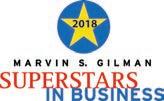
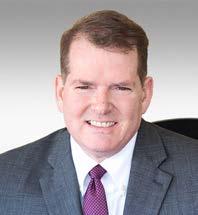

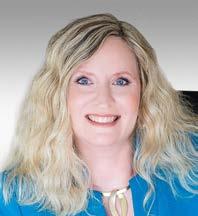






27 DSBA Bar Journal | May 2023 We can help navigate the challenges you and your clients are facing. (302) 656-6632 www.CoverRossiter.com 2018 & 2012 Superstars in Business Winner 2017 & 2011 Award of Excellence Winner Directors: Marie Holliday (Managing Director), Pete Kennedy, and Jennifer Pacilli Contact Jennifer at JPacilli@coverrossiter.com to get started today LAWYERS TURN TO US TO WORK TOGETHER ON COMPLEX MATTERS. CERTIFIED AS A WOMAN BUSINESS ENTERPRISE (WBE) BY THE STATE OF DELAWARE Step up to the mic! Organizing a program or a CLE Seminar is a great way to get exposure and engage with the DSBA! Email your ideas to Caroleena Goldman at cgoldman@dsba.org.
CREATING SPACE IN THE LAW: LEADERSHIP, ADVOCACY & WOMEN
BY KRISTEN S. SWIFT, ESQUIRE
Empowering Women in the Workplace
BY AMANDA K. DOBIES, ESQUIRE
Amanda K. Dobies is an attorney at Kimmel Carter with over eight years of experience practicing personal injury. She can be reached at adobies@ kimmelcarter.com. Her full bio is available at www.kimmel carter.com.


As a young female attorney working in a male-dominated field, I have read many well-written articles discussing gender disparity. These articles focus on themes such as the pay gap — a woman earns on average $.82 to a man’s $1.001 — and most recently, the profound impact Covid-19 has had on women in the workplace. Women leaving the workforce due to childcare, or lack thereof, has set gender equity back an entire generation.2 While these topics are vital to the diversity conversation, the question I address today is what can we do about it?
The first step: build a strong support system. We are all familiar with the adage, “she believed she could, so she did.” This updated aphorism, however, is much more fitting for the advancement of women in this profession: “She believed she could, she built a support system, and so she did.”3
A network filled with those who support your goals can make all the difference in your career. It is during tough times like Covid-19 and unexpected illnesses where we must rely on others for support. We are all familiar with the ups and downs life has to offer- much like a roller coaster. When my husband and I decided to start our family, we had no idea our son would be born three months early and spend 139 days in the NICU. After discharge, he was monitored by eight specialists resulting in doctor visits multiple times a week. My son is four now, and my husband and I still take turns with
monthly doctor visits as well as working remotely when sickness strikes his weakened immune system. At one point, my husband’s blue-collar boss in an entirely male-dominated industry questioned why time off was needed, since his wife should handle such matters. My husband declared that he is just as much a father as I am a mother, and both of our careers are of equal importance. He then went on to take three months off work to care for our medically complex son at the height of Covid-19. Surround yourself with family and friends who value your career as much as their own! Without this support, I am unsure what my future in the law would have looked like.
While I am privileged to have strong familial support, some do not. A supportive network can take many forms: a neighbor, church members, counselors, mentors, fellow parents at child sporting events, and even a local barista! Introduce yourself and get to know these people you interact with every day. They could become great friends. I encourage you to build and strengthen your support system. Easier said than done, right? Strike up conversation with one unfamiliar individual a month.
Once a support network is established, be sure to stay connected and rely on your people. Life is busy and strong individuals often have trouble asking for help, but support systems are only effective if you use them. Remember, there is an ebb and flow to support; we all take turns needing each other. Make a weekly intentional contact with a loved one to stay connected.
Our own personal network can only take us so far. Advancement of women in the legal profession requires supportive workplaces. I am honored to work at the one of the biggest personal injury firms in state, Kimmel, Carter, Roman, Peltz & O’Neill. The firm currently has twelve attorneys, four of which are women. About 35 percent of the attorneys at Kimmel Carter are female. All four women are working moms. We step in without hesitation to cover calendars when the unexpected arises. We rely on each other when daycares and schools close suddenly. We are permitted to work from home when needed, without question. This support makes all the difference when working a demanding career.
28 DSBA Bar Journal | www.dsba.org
When recruited to work for Kimmel Carter, I recall the conversation with Larry Kimmel, Kimmel Carter’s well-respected Managing Attorney. I asked if he was aware of my medically complex child who required flexibility in my schedule. His response? “I am aware, and that is no problem. I trust you will get the job done.” This is the kind of support we all need in the workplace, the type of support that garners a life-time of loyalty and dedication. My favorite quote about working moms is, “This struggle is real. The juggle is real. That’s why everyone should hire working mothers. They are put in crazy situations all the time and are forced to problem-solve. They are some of my most resourceful employees.” 4
Workplace rules and norms should support a reasonable work-life balance to promote diversity and attract top talent. This does not mean female attorneys, particularly those with children, should work less hours just because they have kids. Rather, we ask for flexible work policies that provide a more convenient schedule, such as a remote work policy. Attorneys can still be productive without being in the office. We will do our jobs and do them well, even if we go home at 5:00 p.m. to eat dinner with our families and then pick our work back up after the kids go to bed. Some may leave at 3:00 p.m. to watch their children play soccer, but will surely make up the time by coming in early or on weekends. Most of us know a brilliant, successful female partner by the name of Yvonne Saville. Did you know she not once missed a sporting event for her two children because of work? Now that is inspiring!
Other examples of workplace policies or initiatives that support women in the law are supportive and engaged employers, paid parental leave policies regardless of gender, pay equity policies, the reassessment of compensation systems that emphasize
quality of work as opposed to the billable hour, the creation of Women Initiative groups that provide mentorship and networking opportunities, and the development of wellness and mental health programs. Cohen and Seglias, for example, recently implemented a ramp-down/ramp-up policy that provides breathing room and flexibility in the billable hour requirement as their female attorneys prepare for and adjust to motherhood. 5
How else can we support women in the legal field? Refer work not only to female attorneys, but also support firms that put emphasis on diversity in the workplace. A referral to a law firm like Kimmel Carter directly aids women in the law as there is no greater support than helping build our book of business. Referring work to female attorneys also benefits female clientele because of increased comfort levels due to sharing similar experiences. On the other hand, in practice areas such as family law, men may benefit from hiring a female litigator to appear less confrontational to a jury.
Promote and speak highly of the capabilities of skilled women, informing people how well you regard them. Recommend women for opportunities in the law, such as speaking engagements, a publication, and the like. Be sure that your candidates for promotion include women. Hire women as your expert witnesses, arbitrators and mediators, and court reporting companies.
Since Covid-19, women are exiting the workforce at greater rates than men. Women lawyers need the support of their personal networks and law firms now more than ever.

Notes:
1. Kristen S. Swift, “It is Time to Mind the Gap,” The Journal of the DE State Bar Ass’n, May 2021, at 6.
2. How COVID-19 Sent Women’s Workforce Progress Backward, Julie Kashen, Amanda Novello, Sarah Jane Glynn, August 8, 2022, https://www.americanprogress.org/article/covid19-sent-womens-workforce-progress-backward/.
3. Building a Support System to Empower Women, Marcia Ballinger, August 8, 2022, https://president.lorainccc.edu/building-support-system-empower-women/.
4. Sarah Blakely, founder of ‘Spanx.” See also https://addicted2success.com/quotes/75-empowering-sara-blakely-quotes/.
5. How Law Firms Are Supporting Women Lawyers in the Pandemic, Vivian Hood, August 10, 2022, https://www.jaffepr. com/blog/how-law-firms-are-supporting-women-lawyerspandemic.
6. Sheryl Axelrod, Diversity Miniguide, https://theaxelrodfirm. com/diversity/.
29 DSBA Bar Journal | May 2023
From left: Amanda K. Dobies, Esquire; Jennifer D. Donnelly, Esquire; Linda L. Malkin, Esquire; and Emily Laursen Raisis, Esquire.
A network filled with those who support your goals can make all the difference in your career.
Good Reading
As lawyers, we all have our war stories. Judges too. In Tough Cases: Judges Tell the Stories of Some of the Hardest Decisions They’ve Ever Made, we are treated to a “behind the scenes” look at thirteen cases from around the country, some famous, some not, written by the trial judges and explaining their views on the case, the issues, and the difficulties they faced as judges in deciding the issues before them. Perhaps not surprisingly, there are no breach of contract cases, or simple tort cases, or corporate, bankruptcy, or intellectual property cases. The cases here are family law cases and a few criminal cases — areas where the human element often plays a greater role.
Tough Cases: Judges Tell the Stories of Some of the Hardest Decisions They’ve Ever Made
 Edited by Russell F. Canan, Gregory E.
Mize, and Frederick H. Weisberg
Edited by Russell F. Canan, Gregory E.
Mize, and Frederick H. Weisberg
The New Press, 2018
Leading off the roster is a look at the Terry Schiavo case. For those who don’t recognize the name, or are unfamiliar with the facts, Ms. Schiavo was a 26-year-old woman who went into cardiac arrest in 1990 due to extremely low potassium levels resulting from years of dieting (Ms. Schiavo had weighed as much as 250 pounds, but weighed 110 pounds when she suffered cardiac arrest). Paramedics arrived quickly on the scene, but her brain had been deprived of oxygen for too long, and she was diagnosed as being in a “persistent vegetative state.” For several years, doctors attempted various therapies in an effort to restore consciousness, but were unsuccessful. Finally, in 1998, pursuant to Florida law, her husband petitioned the Florida courts to remove her feeding tube. Ms. Schiavo’s parents opposed the petition. The matter was heard by The Honorable George W. Greer, and we see the case, which became a national cause célèbre, from his perspective. Fourteen appeals, numerous hearings, motions, and remands, and attempted efforts by both the Florida state legislature and the U.S. Congress later, the feeding tube was finally removed once and for all on March 18, 2005, and Ms. Schiavo passed away thirteen days later. In his concluding paragraphs discussing the case, Judge Greer writes: “I have always said that this case did not present a difficult decision.” While Ms. Schiavo lacked a living will or advanced medical directive, the Judge found, based upon the evidence presented at trial, that Ms. Schiavo would not have wanted continuing medical care under the circumstances. But, even though the case may not have been “difficult,” certainly the circumstances became difficult. Judge Greer received death threats, and there were two arrests (one pled out, the other was convicted by a jury). He wore a bullet-proof vest when walking his dog. Police guarded his house during the last 18 months of the case. There were seven motions to disqualify filed at various times. The minister of his church asked him to resign his membership (he received 20 invitations to join other churches). Ultimately, though, the Judge tells us that he has “never regretted becoming a trial judge.”
The Schiavo case is well known, even if all the details are not, but Tough Cases includes other cases not so recognizable. D.C. Superior Court Judge Russell F. Canan tells of his struggles in a particular criminal trial where he sought justice for the defen-

30 DSBA Bar Journal | www.dsba.org
BOOK REVIEW | REVIEW BY
A. FORSTEN, ESQUIRE
RICHARD
d ant, but nearly made matters worse. In that case, a defendant and single father of two teen daughters was charged with Assault With Intent To Kill While Armed (“AWIK”) and the lesser charge of Assault With A Deadly Weapon (“ADW”). The defendant was also charged with Possession Of A Firearm During A Crime of Violence (“PFCV”), which, if convicted of either of the first two charges, meant that he would also be convicted of the PFCV charge, which came with a minimum mandatory prison sentence of five years. If the case had been tried to him, Judge Canan tells us, he would have found not guilty on all the charges; but, when the jury sent a note asking whether it could convict on the ADW charge and not the AWIK charge, the Judge writes that he was shocked given his own view of the evidence. While it would not be the first time a jury had reached a decision contrary to his own views, he was especially concerned here. Prison time for the father, who had no prior record and was in his forties, would be devastating on this daughters; but, even more concerning, Canan strongly believed the defendant innocent. With its question answered (yes, the jury could convict on the ADW alone), the jury might come back from deliberations at any time. It was possible for the Judge to take the case away from the jury and rule that, based on the evidence presented, no reasonable juror could vote to convict, but such action is extraordinarily rare.
Concerned, the Judge called the lawyers into the courtroom and made
a simple statement: “Counsel, I’m well aware of the court’s limited role under Rule 11 for plea bargaining, and I cannot participate in any discussion. I think, though, we all know the import of the jury’s question and what the verdict will be in this case. The defendant has no record, is raising his children, and works. I just can’t see where a five-year mandatory sentence would constitute justice. I strongly urge both sides to consider a plea, even at this late stage.” The lawyers promised to try and left the courtroom.
An hour later, the lawyers informed the Court they had reached a deal, and Judge Canan went back on the bench. While the lawyers and Judge waited, they could hear the defendant and his daughters in the adjoining witness room crying, and so the lawyers and Judge waited for the defendant to compose himself. And then, there was knock on the door leading to the jury room. The jury had reached a verdict. The Judge allowed defense counsel to go into the witness room and retrieve her client, which she did. The Judge then accepted a plea of guilty on the ADW charge, with the other two charges dropped. A sentencing date was set. The jury then came in, was thanked for its service, and dismissed without being asked about their verdict.
Back in chambers, the bailiff brought the verdict form to the Judge. He read it. The jury had found the defendant not guilty on all charges. Although the form was now meaningless in light of the
plea, the Judge had the form sent to the lawyers. Defense counsel made a motion to withdraw the plea, which was granted without opposition, and the government then dismissed all charges.
Would Judge Canan do the same thing again? Probably not, although he struggles to answer that question. “[W]ould I be writing a different story if the jury had found him guilty, as we all thought they were about to do? … I skirted the line in this case and rejected the jury’s prerogative to determine guilt or innocence to avoid what I thought would be a miscarriage of justice. Was justice ultimately done? I think, in the end, it was, but at a cost to my fidelity to the law. I don’t think I would do it again.”
Tough Cases is what it sets out to be. A set of cases which were difficult for one reason or another. But we see judges doing what good judges do — remaining faithful to the law and doing justice despite, at times, enormous outside pressures. As lawyers advocating for our clients, we sometimes forget that there is another side to the story, and that what is crystal clear to us in our advocacy may not be quite so cut and dried to others in the courtroom. The cases may have been “tough,” but the reading is easy, the writing well done, and the stories compelling.
31 DSBA Bar Journal | May 2023
Richard “Shark” Forsten is a Partner with Saul Ewing Arnstein & Lehr LLP, where he practices in the areas of commercial real estate, land use, business transactions, and related litigation. He can be reached at Richard.Forsten@saul.com.
Tough Cases is what it sets out to be. A set of cases which were difficult for one reason or another. But we see judges doing what good judges do — remaining faithful to the law and doing justice despite, at times, enormous outside pressures.
Rodman Ward, Jr. 1934 - 2023
BY THE HONORABLE LEO E. STRINE, JR.
The Inimitable Rod Ward
The inimitable is, by definition, ineffable. And Rodman Ward, Jr. was inimitable.
A relentless optimist driven to prove himself worthy of the regard of his family, friends at the bar, and community, Rod was a quiet force of nature, who never touted his influence on our state or its business law preeminence, but whose positive legacy for both will long endure his lifetime.
A child of a distinguished Delaware family, Rod spent his early years at Wilmington Friends, high school at the George School, college at Williams (a Ward tradition), and graduated from Harvard Law School in 1959. While at Harvard, Rod roomed with his college roommate, William T. Quillen, and their childhood friend, Walter K. Stapleton. At Walter’s District Court investiture, about a decade later, when Judge Quillen was in his first Superior Court term, Rod quipped, “If you had told me in law school that two of the three of us would be a judge, I would have immediately bought a robe.”
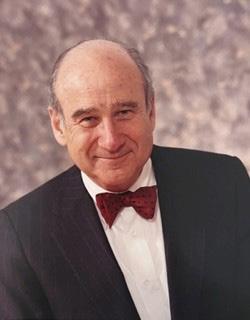
But Rod was more drawn to the role of lawyer than judge. After serving as a judge advocate general in Japan, Rod returned to Delaware with his childhood sweetheart, beloved wife, and partner in crime, Susan. A protégé of William S. Prickett, Sr. — or Mr. Prickett as Rod called him — Rod relished the tactical challenge of being a trial lawyer, within a system where ethical conduct, collegiality to friends on the other side of the “v,” and excellent judges made skillful merits advocacy the ticket to success.
Rod helped make what came to be called Prickett, Ward, Burt & Sanders a premiere firm. During the 1970s, Rod liti-
gated many of the cases exemplifying the transition in American corporate law, when the center of legal gravity was shifting from federal courts — which then had a crucial role in takeover tussles (consider the Alaska Interstate takeover battle) — to state courts. He helped craft Delaware’s director consent statute, which provided a constitutional means for exercising personal jurisdiction over non-resident directors and ensured that Delaware courts could hold corporate fiduciaries accountable. His courtroom excellence secured him the role of go-to Delaware counsel for an emerging law firm led by Joe Flom, who asked him to create and lead Skadden’s first non-New York office in 1979.
Rod paid a price for this move, including deferral of his turn to be Bar President, because many in our Bar feared that Skadden’s entry portended Delaware’s capture by national firms. But Rod never saw it that way. Rather, he viewed Skadden’s establishment of a Delaware office as confirming his own confidence that Delaware’s corporate law system was about to become essential to our national economy and this transformation would benefit our entire community, including the traditional Delaware law firms.
And so it did. The work Skadden alone brought to Delaware made the center of the nation’s M&A boom and cemented its status as corporate America’s go-to jurisdiction. Rod argued iconic cases, such as Mills Acquisition Co. v. Macmillan, Inc., 559 A.2d 1261 (1988), and was involved in others like Moran , Revlon , Interco, Sealy, and Holly Farms. The gravitational pull from M&A gathered the base of entities that increasingly made Delaware the place to litigate not just corporate law cases,
32 DSBA Bar Journal | www.dsba.org IN MEMORIAM
but bankruptcies, IP disputes, and large commercial cases. Indeed, Rod’s last trial was a commercial law saga where he and (now Justice) Karen Valihura led a successful effort for Cantor Fitzgerald before then-Vice Chancellor, later Chief Justice, Myron T. Steele, who, as a promising young lawyer with an incisive mind and interest in public affairs, Rod had enticed to come to Delaware to practice law.
More than his own litigation achievements, Rod took pride in the talent he assembled at One Rodney Square and in instilling in his protégés a commitment to good faith conduct toward adversaries, and excellent advocacy and scholarship (e.g., the Folk book). That unprecedented talent pool — drawn together by Rod’s understated charisma — is a who’s who of American business law leaders comprising members of the state and federal judiciary (including the first woman on the Court of Chancery and the Delaware Supreme Court, Justice Carolyn Berger), corporate and securities law scholars, founders and partners at influential law firms, and respected public servants.
Rod’s disinterest in the bench did not equate to a lack of community service. To the contrary. Rod was a builder, who believed he could make the greatest contribution as a private citizen doing what he could to strengthen the foundations of a just and full society. From inception, Skadden Wilmington supported our judiciary, legal services to the poor, pro bono work, and Delaware’s charitable community. By way of example, prominent colleagues from traditional Delaware firms asked Rod to take on an important case. A powerful senator had sought to talk ex parte to a magistrate about a pending case. When the judge rightly refused, the Senator defeated her confirmation to a new term, raising a question about whether she could continue to serve in holdover status. The traditional firms had business for clients in Dover. Rod told them he did not fear the Senator and took on the case pro bono. Consistent with Rod’s mentorship of emerging talent, he trusted an associate, Randall Thomas, now one of the nation’s most respected corporate law professors, to argue — and win — the matter before the Delaware Supreme Court. Rod also led, along with (later Chancellor) Andy Bouchard, the
team th at secured the return of state control over the New Castle County schools on the assurance that they would treat all students equally.
Rod was personally at the heart of the firm’s public service efforts, leading what is now known as the Combined Campaign for Justice, and co-chairing the Courts 2000 initiative for Chief Justice Veasey and Governor Carper. He served as a director of many non-profits, including on the Finance Committee of the Medical Center of Wilmington when it built Christiana Hospital. Rod took special pleasure in helping the cultural institutions he considered essential to an enlightened society, such as helping Winterthur weather a difficult time in its storied history.
Believing as he did in Delaware’s corporate law potential, Rod did not just found Skadden Wilmington. He also revived a flagging Corporation Service Company — which had been started by his grandfather Christopher Ward and Josiah Marvel — bringing in professional management to kickstart the company into becoming an industry leader and one of our state’s cornerstone employers. And just like Skadden Wilmington, CSC — now led by Rod’s treasured son Rodman Ward III — is an exemplary corporate citizen providing unwavering support to our key charities, schools, and the arts.
What made Rod inimitable, however, can’t be captured by his countless contributions. It was his unique way.
An establishment Delawarean — if Rod was a fish, then the communal table at the Wilmington Club was his favorite water — who showed newcomers the ropes and made them feel welcome. An outstanding advocate whose greatest professional pride was teaching and instilling self-confidence in young lawyers and helping them flower into leaders of the bench and bar. A caring husband and father who mentored young lawyers, by deed not just word, to put those you owe the most — your family — first. A witty, learned man who treasured the diversity of humanity, made life fun and people feel valued. If it is true that you only get what you give, then Rod Ward earned the profound affection and respect so many of us will always have for him.
33 DSBA Bar Journal | May 2023
CLE at HOME View the full online CLE catalog at www.dsba.org/cle. DSBA CLE O NLINE View an online CLE seminar ANYTIME, ANY WHERE.
THE JUDICIAL PALATE | BY SUSAN E. POPPITI, ESQUIRE
Blue Hen Cooking Back in the Day
Th e centennial of the DSBA had me thin king about what Delawareans were cooking in 1923. As none of my dog-eared cookbooks are quite that old, I turned to the internet. A few Boolean searches later, I found a real treasure: The Blue Hen’s Chickens’ Cook Book published in 1921 by the Milford New Century Club.1
Founded in 1898, the Milford New Century Club had a mission of “intellectual growth of its members and the uplift of humanity.” By the end of its inaugural year, membership grew from 25 to 85 women, and the club joined the General Federation of Women’s Clubs (GFWC) of Delaware. Among its many community service initiatives, the Milford New Century Club held discussions on the suffrage m ovement, funded scholarships, supported cancer research, and sponsored art exhibits. 2 Some readers may know the Milford New Century Club’s former home at 6 S. Church Street, now listed as a stop on Milford Museum’s Walking Tour Guide.3
The Milford New Century Club, which no longer exists today, thrived for well over a century. GFWC Delaware, however, remains very active (at 125 years old!) and boasts 21 clubs statewide.4
The women of the Milford New Century Club also promoted the culinary

art s. The Blue Hen’s Chickens’ Cook Book Introduction says it all:
The peninsula which lies between the Delaware and Chesapeake Bays and is composed of the Eastern Shore of Maryland, Delaware, and a little bit of Virginia, has for two hundred years been famous the world over for the lusciousness of its viands and the excellence of its cooking…These recipes were gathered by the ladies of The Milford New Century Club; and all were thoroughly tested before their approval. Only persons wellknown for their cooking were asked to contribute. The publishers hope to perpetuate by this publication the housewifely lore of the Peninsula, and to share it with the public.
As the cookbook’s 116 pages contain recipes for soups, salads, seafood, meats, breads, preserves, canned fruit, and desserts, it was difficult to decide which to highlight. Here are a few that piqued my interest:
A Roaring 20s Jazz Era Finger-Food: DEVILED EGGS
“Fine hard boiled eggs, butter the size of a walnut, half a pint of milk, two teaspoonfuls of cornstarch, heaping
t ablespoonful grated cheese, small coffee spoonful dry mustard; take spoonful of olive oil, salt, red and black pepper; mix the yolks, mustard, olive oil and condiments together in a bowl with the back of a silver spoon; put into the chaffing dish the milk; the butter with which the cornstarch has been mixed; the whites of the eggs, cut fine; a little salt. Stir constantly until boiling hot. In the meantime let some one spread thick over slices of buttered toast the paste, over which scatter the cheese; over this pour this hot white sauce and serve.”
A Seasonal Treat: SOFT SHELL CRABS
“Clean the crabs carefully while alive; season and dip in seasoned egg and cracker dust; fry a light brown. Serve with tartar sauce. For the sauce make a thick mayonnaise, and chopped gherkins and capers.”
A Bushel and a Peck: FRENCH PICKLE
“One-quarter peck green tomatoes, ten onion, one-half head cabbage, two dozen green cucumbers. Chop these fine, salt, and let stand over night. Two dozen pickled cucumbers, one-half pound of ground mustard, three-quarters of a pound of brown sugar, one gallon of
34 DSBA Bar Journal | www.dsba.org
vinegar, two tablespoonfuls white pepper, two tablespoonfuls celery seed, two tablespoonfuls turmeric.
Boil all until onions and tomatoes are tender. Add one wine glass of salad oil when the pickle is cold.”
A Refreshing Palate Cleanser: PEACH SHERBET
“Mash one quart of peaches through a colander, one cup of water; sugar well as it freezes out. Brandy and sherry to taste.”
A Summer Dessert: STRAWBERRY SHORT CAKE
“One quart of flour (heaped), two teaspoonfuls of baking powder, one-quarter pound of butter, two eggs beaten with a small cup of sugar, one cup of milk. Make this into a dough, roll out and divide into two pieces; put one layer of dough on top of the other and bake in a large dish; when baked separate the layers by running a knife between them; put strawberries between the layers and on top; sweeten the berries but do not crush them. Serve fresh with cream.”
A Piece of “Miscellaneous Advice”: TO REMOVE GRASS STAINS
“Cover the stain with molasses. Lay in the sun until dry; then wash in soap and water.”
In researching this piece, I had the pleasure of speaking with two former presidents of GFWC Delaware. Thank you to the women of the Milford New Century Club for shedding some light on what may have been on the dinner tables of DSBA members back in 1923.
Notes:
1. Milford New Century Club, The Blue Hen’s Chickens’ Cook Book, Milford Chronicle Publishing Co., 1921. Library of Congress, https://catalog.loc.gov/ vwebv/search?searchCode=LCCN&searchArg=22 001529&searchType=1&permalink=y. Accessed 3 April 2023.
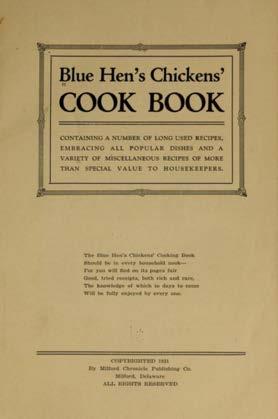
2. MSS 0542, Milford New Century Club records, Special Collections, University of Delaware Library, Newark, Delaware. https://library.udel. edu/special/findaids/view?docId=ead/mss0542. xml;tab=print.
3. “Self-Guided Walking Tours.” Milford Shipyards. https://www.milforddemuseum.org/walkingtours/.; “A Guide to Milford’s Historic and Notable Properties.” Milford Museum. Accessed April 21, 2023. https://www.milforddemuseum. org/wp-content/uploads/2022/06/walking-tourguide-2.pdf.

4. “GFWC Delaware. ”https://sites.google.com/ view/gfwc-delaware/.
Susan

35 DSBA Bar Journal | May 2023
E. Poppiti is a mathematics educator and is pursuing qualifications in wine. Susan can be reached at spoppiti@ hot mail.com.
LOOKING TO GROW AND BUILD YOUR CLIENT BASE? J oin the online DSBA Lawyer Referral panel at www.dsba.org. O pting in is simple and free to all DSBA members.
Milford New Century Club
POSITIONS AVAILABLE
HECKLER & FRABIZZIO is seeking to grow its Delaware Defense Litigation practice with a Delaware-licensed attorney with 1 to 3 years of experience. Interested applicants should send their resumes and writing samples to pchase@ hfddel.com.
CLASI IS HIRING ATTORNEYS
including a Managing Attorney for our Disabilities Law Program. Please check our website for details about all the available positions. http://www.declasi. org/employment/.
WHITE AND WILLIAMS LLP’S Delaware office is actively recruiting for its Product Liability practice group. We represent some of the largest companies in the world in complex, high stakes cases and are looking for lawyers with 1 to 3 years of litigation experience to join our team. We offer a flexible, hybrid home/office work schedule backed up by 24x7 technical support. In addition to a competitive salary and excellent benefits, we are committed to the professional development of our young lawyers, including through trial advocacy programs, extensive client contact, and courtroom opportunities. Delaware Bar admission or a willingness to sit for the Delaware Bar is required. Please send your resume to Stacie Wood Chapman at woodchapmans@whiteandwilliams. com for consideration.
CASARINO CHRISTMAN SHALK
RANSOM & DOSS, P.A. is seeking an attorney to join its Delaware litigation practice. Starting salary $100,000+ depending on experience. Qualifications: Admission to Delaware Bar; Excellent verbal communication, writing and interpersonal skills; Excellent time management and organizational skills; Ability to work well with others in a friendly, professional work environment. Send cover letter and resume to: Casarino Christman Shalk Ransom & Doss, P.A., P.O. Box 1276, Wilmington, DE 19899. Attn: Kenneth M. Doss, Esq.
DELAWARE DEPARTMENT OF
JUSTICE currently has employment opportunities available for Deputy Attorney General positions in multiple divisions. For all opportunities and full job descriptions, please visit: https://attorneygeneral.delaware.gov/ executive/hr/career-opportunities/.
INTE RESTED IN BURNISHING
YOUR CREDENTIALS for that judicial appointment? Interested in protecting the public from unprofessional conduct by licensees of dozens of State regulatory boards? The Delaware Division of Professional Regulation anticipates a vacancy in the position of Chief Hearing Officer (CHO). The CHO supervises the Division’s Administrative Hearing Unit (AHU). Hearing officers in the AHU hear complaints against licensees of State boards and commissions and make appropriate disciplinary recommendations to those bodies. In addition to hearing and administrative functions, the CHO oversees the processing of complaints and the scheduling of hearings which are convened in Dover and Wilmington. The Division of Professional Regulation is a small collegial State agency staffed by a group of skilled and committed employees within the Department of State who provide administrative staff support to all Title 24 professional boards and other entities. Applicants must be Delaware residents and members of the Delaware Bar. 29 Del C . Sec. 8735(v).
Participation in some administrative hearings a plus, and strong writing skills a must. Competitive salary and benefits. Letters of interest and curriculum vitae should be submitted to Shauna Slaughter, Acting Director, Division of Professional Regulation, 861 Silver Lake Blvd., Dover DE 19904, or to shauna.slaughter@delaware.gov. Questions about the position may be directed to Shauna Slaughter at (302) 744-4503, or to Roger Akin at (302) 744-4515 (roger.akin@delaware.gov).
THE CITY OF WILMINGTON
LAW DEPARTMENT seeks two attorneys. Two to 3 years experience preferred. Litigation, employment and labor law, environmental and/or transactional law experience are being sought. Must have current Delaware Bar. Salary negotiable. Excellent benefits package (including family medical and dental coverage, pension plan, CLE allowance, professional membership dues, with thirteen paid holidays in addition to 18 days of vacation). Please forward resume with cover letter to: City of Wilmington Law Dept., Attn: Robert M. Goff, 800 French St., 9th Fl., Wilmington, DE 19801-3537, or email to Javette Lane at jlane@wilmingtonde. gov. Full job descriptions available at www.wilmingtonde.gov.
BANKRUPTCY & INSOLVENCY
GROUP OF ASHBY & GEDDES, P.A. is seeking to expand its team with a Delaware-licensed attorney with 1 to 3 years of experience. Superior academic credentials and strong oral and written communication skills required. Must be a team player with an excellent work ethic. Interested candidates should email a resume, writing sample, and transcript to KTsaganos@ashbygeddes. com.
MG+M THE LAW FIRM is recruiting an Associate with 4-8 years of experience for our Wilmington, Delaware office. This associate will be working primarily on Delaware and national commercial and general litigation for a growing practice area of the firm. Delaware bar license or willingness to take the Delaware bar is required. This is an excellent opportunity to join a nationally recognized and growing litigation firm with opportunities to perform challenging legal work and work directly with clients on day one. Candidates should have strong writing ability and organizational skills. MG+M offers an excellent benefits package in a flexible, hybrid work environment. Please email resume to wlarson@mgmlaw.com.
36 DSBA Bar Journal | www.dsba.org
BULLETIN
BOARD
CHRISTENSEN & DOUGHERTY, LLP seeks a junior to midlevel associate to work in our complex commercial and corporate litigation practices. Delaware Bar admission (or pending) required. We offer a competitive salary, a collegial and flexible work environment, and the opportunity for early growth and responsibility. Interested applicants should send résumé and writing sample to contact@christensendougherty.com.
BAIRD MANDALAS BROCKSTEDT FEDERICO & CARDEA LLC is seeking a Trust and Estate Attorney who has been an active member of the DE Bar for 1 to 5 years to join our growing Trust and Estate practice in our Lewes office. The candidate should be self-motivated, analytical, and detail orientated, with excellent written and verbal communication skills. The firm offers a competitive salary and an excellent benefits package. Candidates should submit resume to Holly Moore at holly@bmbfclaw.com.
MARKS, O’NEILL, O’BRIEN, DOHERTY & KELLY, P.C., a regional insurance defense firm, is looking for smart, hardworking Delaware attorneys of all experience levels who: 1) want to have the opportunity to work directly with clients; 2) are interested in taking depositions, arguing motions and defending clients at trial; and 3) believe they have the ability to handle matters independently either now or in the future. Candidates do not need to bring clients with them or develop clients (although those efforts have firm support.) What are you waiting for? Get started on your next career move. We have a hybrid home/office work culture, competitive salary and benefits. Candidates should email: ddoherty@moodklaw. com. We are an Equal Opportunity Employer.
OFFICE SPACE
LAWYERS’ ROW SUITE: 16’X9’ Furnished Office with 11’X7’ Window Plus 8’X7’ Workstation Plus Shared Access to Conference Room (14’X12’), Kitchen, and Reception Area; $900; (302) 888-1275.
FURNISHED FULL-SERVICE PROFESSIONAL OFFICE SPACE with parking available. Ideal downtown office location at reasonable rates with flexible lease terms. 1201 N. Orange Street, Wilmington. Delaware State Chamber of Commerce Building. Condo Owner/manager (David N. Williams and John L. Williams) on-premises. Flexible lease duration. 2,245 square feet–Suite 500. 4-Fully furnished offices and large conference room, plus reception and paralegal space and kitchenette. $3,750/mo. full service (includes cleaning, utilities) (discounted parking available). 293 Square Feet–Suite 504. Fully furnished Single office $750/mo., full service (can be combined with Suite 500). (Access to 6th floor conference room available) (discounted parking available). For more information contact Dave@Trust Williams.com or call David or John at (302) 575-0873.
BULLETIN BOARD ADVERTISING INFORMATION
Bulletin Board rates are $50 for the first 25 words, $1 each additional word. Additional features may be added to any Bulletin Board ad for $10 per feature. The deadline to place a Bulletin Board ad is the 15th of the month prior to the month of publication.
All Bulletin Board ads must be received electronically and prepayment is required. Submit the text of the Bulletin Board ad and payment to rbaird@dsba. org. For more information, contact Rebecca Baird at (302) 658-5279.
37 DSBA Bar Journal | May 2023
From the DSBA Archives


LAW DAY 1971





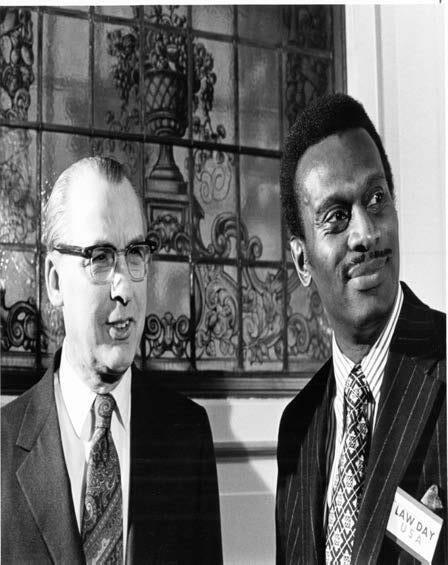
38 DSBA Bar Journal | www.dsba.org THE LAST WORD
The Honorable Collins J. Seitz, then-Chief Judge of the United States Court of Appeals for the Third Circuit, and Honorable Edward F. Bell, Circuit Judge, Wayne County, Michigan, and President of the National Bar Association, prior to dinner on May 3, 1971. Judge Bell was the featured speaker at the dinner and Judge Seitz introduced him to the audience.
The Honorable Andrew D. Christie, then-Associate Judge of the Superior Court of the State of Delaware, at a table with students.
L. Vincent Ramunno, Esquire, attorney and then-member of the Law Day Committee, at a table with students.
The Honorable A. James Gallo, thenJudge, Court of Common Pleas of New Castle County, at a table with students.
The Honorable Joseph R. Biden, Jr., then-member of the County Council of New Castle County and an attorney, at a table with students.
BENCH AND BAR
THURSDAY, JUNE 15, 2023 CONFERENCE 2023
JOHN M. CLAYTON HALL | NEWARK, DELAWARE
KEYNOTE SPEAKER
Aaron N. Taylor
Senior Vice President, Executive Director at AccessLex Institute Center for Legal Education Excellence
Aaron N. Taylor provides leadership and oversight for the AccessLex Center for Legal Education Excellence®. He joined AccessLex Institute in June 2017 from Saint Louis University School of Law, where he served as a Professor of Law. Dr. Taylor also served as director of the Law School Survey of Student Engagement, a national study that seeks to measure the effects of legal education on students.
CONFERENCE SCHEDULE
8:00 a.m. - 9:00 a.m. Registration Breakfast/Vendor Visit 9:00 a.m. - 9:15 a.m. Opening Session State of the Judiciary
9:15 a.m. - 10:45 a.m. CLE Plenary Session with Keynote Speaker Aaron N. Taylor Reform and Rigor: How Delaware’s Bar Admission Reform Efforts Can Be a Model for the Nation 10:45 a.m. - 11:00 a.m. Beverage Break/Vendor Visit 11:00 a.m. - 12:00 p.m. Annual Meeting 12:00 p.m. - 1:00 p.m. Lunch Reception 1:00 p.m. - 2:30 p.m. CLE Breakout Sessions
Choose one Session: Civil Litigation, Chancery Law, Criminal Law, or Family Law 2:30 p.m. - 3:00 p.m. Dessert Reception and Toast
ANNUAL MEETING
Join us for a Dessert Reception and Toast where you can catch up with colleagues, make new acquaintances, visit the sponsors and vendors, and celebrate 100 Years of the Delaware State Bar Association!
Hosted by The Honorable Collins J. Seitz, Jr. Chief Justice of the Supreme Court of Delaware Justice Karen L. Valihura and Justice Gary F. Traynor, The Delaware Judicial Conference, and the Delaware State Bar Association
Presided over by Charles J. Durante, Esquire, Delaware State Bar Association President

Presentation of the First State Distinguished Service Award to William E. Manning, Esquire Election of 2023-2024 Executive Committee Members
Passing of the Gavel to the new Delaware State Bar Association President, Kate Harmon, Esquire
VISIT WWW.DSBA.ORG FOR MORE INFORMATION AND TO REGISTER.
DELAWARE STATE BAR ASSOCIATION
CELEBRATION
1923 2023
The Delaware State Bar Association Insurance Program
Advised and Administered by USI Affinity
The Delaware State Bar Association Insurance Program, advised and administered by USI Affinity, offers a proprietary, comprehensive Lawyers’ Professional Liability program. Along with other business insurances to attorneys and law firms in Delaware.
As a leading insurance broker for Lawyers’ Professional Liability, USI Affinity has been protecting Lawyers for over 50 years. We understand the business and the risks that attorneys and law firms face every day.

Contact USI Affinity Today: 1.855.USI.0100
LPLCoverage@usi.com
Lawyers Professional Liability
The DSBA Insurance Program Lawyers
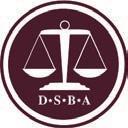
Professional Policy offers proprietary savings and coverages specifically designed to mitigate risk and close gaps in coverage.
Directors and Officers Liability
Directors & Officers Liability insurance protects the past, present, and future directors and officers of a law firm from losses arising from “wrongful acts”.
Employment Practices Liability
EPLI coverage can be specifically designed to help protect the personal assets of a privately owned firm’s directors and officers, as well as the financial well being of the firm itself.












































 BY RICHARD D. KIRK, ESQUIRE
BY RICHARD D. KIRK, ESQUIRE













































































































 Edited by Russell F. Canan, Gregory E.
Mize, and Frederick H. Weisberg
Edited by Russell F. Canan, Gregory E.
Mize, and Frederick H. Weisberg















